
Strike the Shepherd
Down through history God has often struck and scattered His people
to provoke them to a long-term higher good.
His long term plan is to unite His people in one Body.
In that day there will be a highway from Egypt to Assyria, and Assyria will come into Egypt, and Egypt into Assyria, and the Egyptians will worship with the Assyrians.
In that day Israel will be the third with Egypt and Assyria, a blessing in the midst of the earth, whom the Lord of hosts has blessed, saying,
“Blessed be Egypt my people, and Assyria the work of my hands, and Israel my inheritance.”
(Isaiah 19:23-25)
A String of Paradoxes
God and the Lockdown
Screws are Being Tightened
In the Spring of 2020, governmental leaders around the world simultaneously locked us all down
--ostentatiously because of the threat of a new virus.
All sectors of life have been impacted, but the closing of churches and world-wide impact
on all sort of Christian gatherings has been puzzling for most followers of Jesus.

Premise
In our universe, which was created by God, there is no such thing as chance, there are no accidents.
The management of everything involves both His Left Hand and His Right.
God has interrupted the linear flow of history a number of times in the past, and more are scheduled for the future.
The history of God working in history is non-linear.
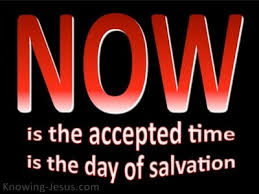
The deepest bond in the universe is that which exists between God the Father and His Son, Jesus.

The First Historical Disconnect for the Followers of Christ
After the Last Supper, Jesus said something strange and incongruous:
And when they had sung a hymn, they went out to the Mount of Olives.
Then Jesus said to them, “All of you will be made to stumble because of Me this night, for it is written:
‘I will strike the Shepherd,
And the sheep of the flock will be scattered.’
(Matthew 26:30-31)
 He was quoting the prophet Zechariah whose original statement was even more incongruous and strange:
He was quoting the prophet Zechariah whose original statement was even more incongruous and strange:
Awake, O sword, against My Shepherd,
Against the Man who is My Companion,”
Says the LORD of hosts.
“Strike the Shepherd,
And the sheep will be scattered;
Then I will turn My hand against the little ones. And it shall come to pass in all the land,”
Says the LORD,
“That two-thirds in it shall be cut off and die,
But one-third shall be left in it: I will bring the one-third through the fire,
Will refine them as silver is refined,
And test them as gold is tested.
They will call on My name,
And I will answer them.
I will say, ‘This is My people’;
And each one will say, ‘The LORD is my God.’ ” (Zechariah 13:7-8)
THE SHEPHERD IS SLAIN (13:7): In a most vivid personification, the "sword" is addressed as an instrument of death and instructed to move against the shepherd.
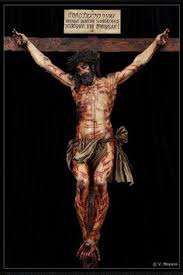 Yahweh calls the shepherd "My Shepherd," indicating that this Shepherd is no ordinary leader. Indeed, Yahweh also calls him "the Man who is My Companion." Surely that is more than high praise. This Shepherd is One who is side by side with, or the equal of, the Lord! The term "associate" (or "Companion," v. 7) is used to refer to those who are close neighbors or close companions (Leviticus 6:2; 18:20; 19:15). The equality that such a relationship brings to mind is the equality with God claimed by Jesus in John 10:30 and 14:9. The Shepherd's close association with the Lord strengthens the case for identifying him as the Shepherd of 11:4-14 and the One who was pierced in 12:10.
Yahweh calls the shepherd "My Shepherd," indicating that this Shepherd is no ordinary leader. Indeed, Yahweh also calls him "the Man who is My Companion." Surely that is more than high praise. This Shepherd is One who is side by side with, or the equal of, the Lord! The term "associate" (or "Companion," v. 7) is used to refer to those who are close neighbors or close companions (Leviticus 6:2; 18:20; 19:15). The equality that such a relationship brings to mind is the equality with God claimed by Jesus in John 10:30 and 14:9. The Shepherd's close association with the Lord strengthens the case for identifying him as the Shepherd of 11:4-14 and the One who was pierced in 12:10.
The sword is told, "Strike the Shepherd" (v. 7c). This accords with what Isaiah taught: "Yet it pleased the LORD to bruise Him" (Isaiah 53:10). Thus Jesus was delivered up in accordance with the definite plan of God, although it is the men who did the deed who are culpable for what they did (Acts 2:23). As a result of Messiah's death, the sheep were scattered. This act of dying was too much to accept for any contemporary Jewish view of the Messiah. The cross would continue to be an offense as long as the Gentile period lasted. Even "the little ones" (v. 7d) suffered as the tradition of resisting the significance of Jesus' hideous death was passed on from parents to children.
THE SHEEP ARE DECIMATED (13:8-9): One of earth's most devastating disasters will take place in the end times. "Two thirds in [the land of Israel] shall be cut off and die" (v. 8a). Israel's present population is somewhere around 14 million. What it will swell to by the time this text is fulfilled we do not know, but God has promised to lead in a restoration of the Jewish people to the land of Israel. When that takes place there may be some eight to twenty million people in Israel. Think of it: "two-thirds" of whatever the population is in that day will be killed!
The remaining "one third" will be brought through this affliction (v. 9a). They will be like brands plucked from the fire (Ezekiel 5:4; Malachi 3:3). All impurities will have been refined away by this experience and by the cry of repentance already traced in this chapter. Finally, the remaining one-third shall "call on [the LORD'S] name" (v. 9d). And the Lord has promised to answer them when they call. "Each one will say, 'The LORD is my God'" (v. 9f). Only then will the first part of the tripartite formula of the ancient promise-plan of God be re-instituted: "I will be your God, You shall be My people, and I will dwell in the midst of you" (e.g., see Hosea 2:23; Ezekiel 36:23,27,28). In that day, as Paul exclaimed, "All Israel will be saved" (Romans 11:26-7).
The Shepherd in 13:7-9 must be our Lord Jesus Christ. Who else has such a close relationship with the Father? So what will it take for Israel-and all the world-to recognize who this Shepherd really is? We can be assured that at least Israel will finally come to her senses, but oh, by what a national bloodbath from the nations! Would that more Jews and Gentiles would come to the Messiah even now before these terrible days must be endured. (Walter Kaiser)

Why God Scatters the Sheep?
Jesus quoted Zechariah about striking the Shepherd and scattering the sheep. the basic intent is clear, because immediately applied by Matthew in the text itself. Two questions arise with every NT quotation of an OT text, particularly those spoken by Jesus. First, how did Jesus understand the text and His own relationship to it? The record is clear that He saw Himself as the central focus of all the Old Testament scriptures, so we must (as far as possible for us) attempt to view the quoted text through that lens. This question has to do with the inherent meaning of the text as designed by the Holy Spirit to testify of Christ. It is a question rather apart from the usual pursuit of “authorial intent”, since we know that the human authors of the biblical books were often and to a large extent unaware of the full meaning, significance and implications of their inspired writings.
Second, how did He intend His audience then (and by extension us today) to understand such a quotation? This has ore to do with areas of interpretation and application instead of direct meaning and connotation. Of course there is often considerable overlap between the two questions, and the they can often be distinguished more easily in principle than in practice. This is where the usual factor for accurate interpretation come into play: historical context, literary form, linguistic considerations,, and so forth. In this approach, it is always necessary to bear in mind that NT quotations of OT texts do not entirely depend for their aptness of reference or interpretation on the exact verses cited. The Hebrew text of that era was not divided into the chapters and verses with which we are familiar today. Scripture quotations in those days functioned more broadly that the sourced footnotes of modern scholarship. A quotation was intended tow holistically include the entire context of a passage, it’s placement and function in a section of book, and its relative “heft” and orientation in relation to the entire book itself.
Dr. Tom Constable’s notes on the book which can particularly help in answering the second of the two questions above. For instance, speaking of the overall literary unit of Zechariah 9-14, Constable notes the following:
This part of Zechariah contains two undated oracles that are almost entirely eschatological. They expand the eschatological vision in chapters 1—8, and modify its generally optimistic view, with emphasis on Israel's purification. The prophet may have composed these chapters after the temple was completed. The phrase "on that day" occurs 18 times and points to the distant future, as is clear from their contexts. The centerpiece of this section is the messianic King who will appear and bring both judgment and blessing. These chapters are the most quoted section of the Prophets in the Gospel narratives and, next to Ezekiel, Zechariah has influenced the author of Revelation more than any other Old Testament writer."
There is much here to occupy us and, since this provides the “key” verses for the saga, we need to make sure to anchor what is said in the text itself.
Also applicable—Jesus clarifies His understanding of the “scattered flock” with immediate application to his disciples. He actually addresses Simon Peter in particular (as so often, the group’s representative) on the subject of His own soon "being smitten” and Peter’s personal “scattering”…
"And the Lord said, “Simon, Simon! Indeed, Satan has asked for you, that he may sift you as wheat. But I have prayed for you, that your faith should not fail; and when you have returned to me, strengthen your brethren.”
Dr. Tom Constable’s notes: Here we gain a glimpse into the mystery of concurrent purposes and diverse intentions of disparate persons—all exercising their own free wills, while simultaneously being orchestrated and overruled by the Almighty to achieve His own ends. The actors include the Jewish and Roman authorities, the Jewish people at large gathered in Israel for the feast, the disciples collectively and Simon individually, the Prince of Evil in person, and of course the central figure of Jesus Christ at the still center of the chaotic storm of events already in progress.
The “sifting” of Peter (equivalent to the “scattering” spoken of by Zechariah) is an extreme and searing trial that will not only scour away the loose topsoil of a seemingly committed religious life, but seek by its impact to shatter the very bedrock of Simon’s faith and life. And here we are also provided a behind-the-scenes view of the powerful and effective undertaking of Christ on Peter’s behalf (and by extension, on our own). Just as faith in Jesus is itself the gift of God, Peter’s continuance and even survival in that faith is based, not on his own strength or endurance but on that of Christ Himself.
Jesus has already prayed for Peter in advance, and received the Father’s assurance of this disciple’s preservation despite the concerted and focused efforts of the Evil One personally. This privilege was not extended to the traitor, Judas Iscariot. Much ink has been spilled over what theologians call “the Perseverance of the Saints”-but here we see that the issue is ultimately a matter o the perseverance and faithfulness of Jesus Christ Himself, and His intercessory prayers on our behalf, as out Great High Priest continuous offered even now in the True Tabernacle in the heavenlies.
It is a truism of Gospel research that Christ's gathered of The Twelve was symbolic re-constitution of Israel on the spiritual basis of relationship with Himself, and that these men would become, in essence, the the moral equivalent of the patriarchs of the Twelve Tribes. These were Israel’s representative men, just as Israel herself had been chosen to become God’s representative People among all the nations of the earth. Curiously, the concept of “sifting”—so pointed applied to Peter as the leading member of the apostolic company—seems to only occur in two other passages of Scripture. These are both in the Old Testament, and doubtless shaped the understanding of Jesus when He used this metaphorical figure of speech to indicate Peter’s immanent and ultimate test.
Chapter 9 of the prophet Amos would become a critical passage (perhaps THE critical one) in the self-understanding of the first generation of Christians (see the record of the “Jerusalem Council” in Acts 15). The prophesied resurrection of Jesus of Nazareth is spoken of in verse 11, and the consequent establishment of the Church as “the residue of humanity” and a new People "called out" (GK: ekklesia) from the nations of the earth seen verse 12. But in unbroken connection with those events, and immediately preceding, come verses 9-10…
"For surely I will command,
And will sift the house of Israel among all nations,
As grain is sifted in a sieve;
Yet not the smallest grain shall fall to the ground.
All the sinners of my people shall die by the sword,
who say, ‘The calamity shall not overtake nor confront us.’”
Here, all of the natural nation of Israel is foretold to be scattered and “sifted." From Zechariah, we know this is the direct consequence of their rejection and “siting” of Jesus as God’s Messiah (“The Good Shepherd”). Peter and the other disciples become truly the representatives of Israel in this initial scattering from Gethsemane and from Golgotha—a down-payment on the downfall of the nation at large in A.D. 70, an even likewise involving all the same actors and purposes at work the crucifixion of Jesus. Surely it was His understanding and heart-appropriation of such Scriptures as this one that prompted the thrice-repeated lament of Jesus over Jerusalem as His People.
Yet, it must be recalled that there is another use of “sifting” in the Hebrew Scriptures, which reminds us in turn, of Israel’s unprovoked initial calling to be a “Kingdom of priests” in representation for all humanity. Isaiah 30 widens our scope of view regarding the combined judgment of God and fury of Satan—not only form Peter to the disciples, and the disciples to Israel, but from Israel to all the nations of the earth.
"Behold, the name of the Lord comes from afar,
Burning with His anger,
And His burden is heavy;
His lips are full of indignation,
And His tongue like a devouring fire.
His breath is like an overflowing stream,
Which reaches up to the neck,
To sift the nations with the sieve of futility;
And there shall be a bridle in the jaws of the people,
Causing them to err."
Here Isaiah, the most comforting and evangelical of all the prophets, delivers a burden that encompasses not only punishment for Israel’s sins and the promise of ensuing restoration, but also anticipates the coming of “that great and terrible Day of the Lord” that pervades all Old Testament prophecy. The restored Apostle Peter, quoting Joel on the Day of Pentecost, points to that day’s events as prophetic (first) of Israel’s opportunity even then to repent before the coming judgment, and (second) indicating an even earth future when that judgment would become global and cosmic in its scope.
Jesus Christ was smitten and the disciples scattered, the nation of Israel demolished and dispersed, and the the coming destruction of man’s petty kingdoms was both ensured and confirmed. Israel’s rebellion against Jesus at His first coming was a single people on a small stage, but there is coming an insurrection against Christ in the approach to His second arrival that will be global in scope, satanically inspired, and ruthlessly punished at His appearance.
"Then the seventh angel sounded: And there were loud voices in heaven, saying, “The kingdoms of this world have become the kingdoms of our Lord and of His Christ, and He shall reign forever and ever!” And the twenty-four elders who sat before God on their thrones fell on their faces and worshiped God, saying: “We give You thanks, O Lord God Almighty,
The One who is and who was and who is to come,
Because You have taken Your great power and reigned.
The nations were angry, and Your wrath has come,
And the time of the dead, that they should be judged,
And that You should reward Your servants the prophets and the saints,
And those who fear Your name, small and great,
And should destroy those who destroy the earth.”
(Revelation 11:15-18)
"Why do the nations rage,
And the people plot a vain thing?
The kings of the earth set themselves,
And the rulers take counsel together,
Against the Lord and against His Anointed, saying, “Let us break Their bonds in pieces
And cast away Their cords from us.”
"He who sits in the heavens shall laugh;
The Lord shall hold them in derision.
Then He shall speak to them in His wrath,
And distress them in His deep displeasure:
“Yet I have set My King
On My holy hill of Zion.”
“I will declare the decree:
The Lord has said to Me,
You are My Son,
Today I have begotten You.
Ask of Me, and I will give You
The nations for Your inheritance,
And the ends of the earth for Your possession.
You shall break them with a rod of iron;
You shall dash them to pieces like a potter’s vessel.’ ”
"Now therefore, be wise, O kings;
Be instructed, you judges of the earth.
Serve the Lord with fear,
And rejoice with trembling.
Kiss the Son, lest He be angry,
And you perish in the way,
When His wrath is kindled but a little.
Blessed are all those who put their trust in Him." (Psalm 2)


Jesus Death: Six Hours of Eternity on the Cross

Scattering Example 1: The Eviction of our First parents from Eden
 Then the LORD God said, “Behold, the man has become like one of Us, to know good and evil. And now, lest he put out his hand and take also of the tree of life, and eat, and live forever”--therefore the LORD God sent him out of the garden of Eden to till the ground from which he was taken. So He drove out the man; and He placed cherubim at the east of the garden of Eden, and a flaming sword which turned every way, to guard the way to the tree of life.“ (Genesis 3:22-24)
Then the LORD God said, “Behold, the man has become like one of Us, to know good and evil. And now, lest he put out his hand and take also of the tree of life, and eat, and live forever”--therefore the LORD God sent him out of the garden of Eden to till the ground from which he was taken. So He drove out the man; and He placed cherubim at the east of the garden of Eden, and a flaming sword which turned every way, to guard the way to the tree of life.“ (Genesis 3:22-24)
God Himself planted a garden for man to the East in the land of Eden. It was a splendid place, a perfect home for our original parents. Orchards and vines provided fruits of every kind. Animals were there also. It was Paradisaical. But Eve, then Adam, rebelled against the benevolent rule of their Creator. Should they happen to eat fruit from the Tree of Life, they would live forever in their fallen state. Hastily, the Lord excluded them out by the main gate and placed great angels with flaming, whirling swords to guard the way to the tree of life. They could only re-enter the Garden by way of the Cross. Today we can look into Paradise through that gate, but full access will be ours only when we are home with Jesus in New Jerusalem.
“He who has an ear, let him hear what the Spirit says to the churches. To him who overcomes I will give to eat from the tree of life, which is in the midst of the Paradise of God.” (Revelation 2:7)
And he showed me a pure river of water of life, clear as crystal, proceeding from the throne of God and of the Lamb. In the middle of its street, and on either side of the river, was the tree of life, which bore twelve fruits, each tree yielding its fruit every month. The leaves of the tree were for the healing of the nations. And there shall be no more curse, but the throne of God and of the Lamb shall be in it, and His servants shall serve Him. They shall see His face, and His name shall be on their foreheads. There shall be no night there: They need no lamp nor light of the sun, for the Lord God gives them light. And they shall reign forever and ever." (Revelation 22:1-5)

Judgment Example 2: The Flood of Noah
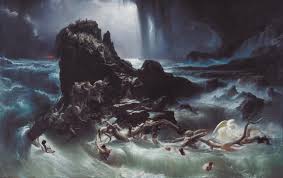 Then the LORD saw that the wickedness of man was great in the earth, and that every intent of the thoughts of his heart was only evil continually. And the LORD was sorry that He had made man on the earth, and He was grieved in His heart. So the LORD said, “I will destroy man whom I have created from the face of the earth, both man and beast, creeping thing and birds of the air, for I am sorry that I have made them.”
Then the LORD saw that the wickedness of man was great in the earth, and that every intent of the thoughts of his heart was only evil continually. And the LORD was sorry that He had made man on the earth, and He was grieved in His heart. So the LORD said, “I will destroy man whom I have created from the face of the earth, both man and beast, creeping thing and birds of the air, for I am sorry that I have made them.”
In the ~1656 year time span--from the creation of everything (including the first two humans) to the Flood, the world population rose from two people to probably as high as it is now--perhaps to ~9 billion persons! Some people came to know God early on in the Antediluvian age, but as time went by, fewer and fewer were interested in living in harmony with their Creator. Noah as evangelist pleaded with everyone for 110 years, offering them escape from the impending flood for free, but in the end only Noah, his three sons and their wives, climbed on board the Ark they had built, and were saved.
The Antediluvian world may well have been technologically and scientifically more advanced than we are now, people lived nearly a thousand years. All traces of the Antediluvian culture were buried in the Deluge.
God reduced the total world population down to eight adults in short order. But probably a billion or more people were "saved" before the flood? That is, they knew God personally because they were reconciled to Him. (If you know Jesus expect to meet Noah, and Adam.) God has always saved everyone who is willing to be saved! Many people today live in denial that God will soon move in judgment again, though the evidence that this is about to happen is everywhere!
"...if God did not spare even angels who had sinned, but condemned them to the lowest hell and committed them to the pits of darkness, where they remain kept for judgment; if he did not spare the ancient world, but preserved in safety Noah, the preacher of righteousness, with seven others, when he dispatched the flood on a world of impious men; if he reduced the cities of Sodom and Gomorrah to ashes, when he sentenced them to destruction and so gave an example of what would happen to those who would one day act with impiety, but rescued righteous Lot, who was distressed by the blatantly immoral conduct of lawless men, for, to such a man, righteous in his looking and in his hearing, it was torture for his righteous soul to live his daily life amidst such people and amidst such lawless deeds if all this is so, you can be sure that the Lord knows how to rescue truly religious men from trial and how to preserve the unrighteous under punishment, until the day of judgment comes, especially those whose lives are dominated by the polluting lusts of the flesh and who despise the celestial powers. Audacious, self-willed men they are; they do not shrink from speaking evil of the angelic glories, whereas angels who are greater in strength and power do not bring an accusation of evil against them in the presence of the Lord." (2 Peter 2:4-11)
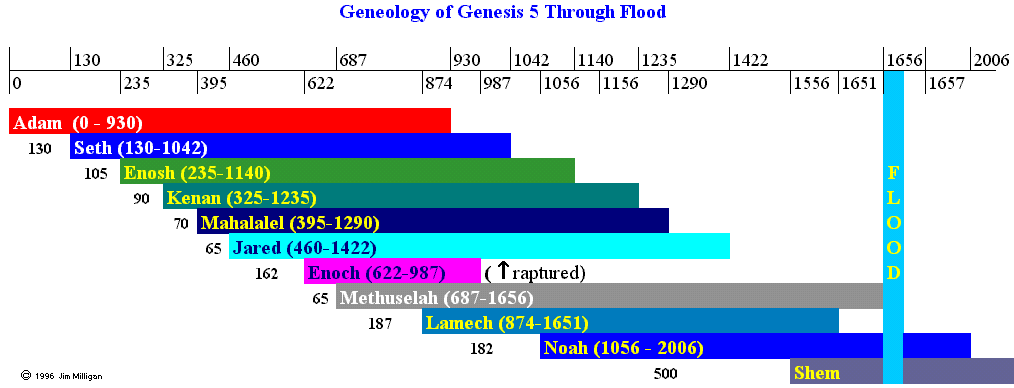

Dispersal Example 3: The Tower of Babel Affair
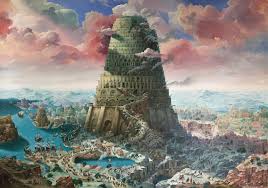 Now the whole earth had one language and one speech. And it came to pass, as they journeyed from the east, that they found a plain in the land of Shinar, and they dwelt there. Then they said to one another, “Come, let us make bricks and bake them thoroughly.” They had brick for stone, and they had asphalt for mortar. And they said, “Come, let us build ourselves a city, and a tower whose top is in the heavens; let us make a name for ourselves, lest we be scattered abroad over the face of the whole earth.”
Now the whole earth had one language and one speech. And it came to pass, as they journeyed from the east, that they found a plain in the land of Shinar, and they dwelt there. Then they said to one another, “Come, let us make bricks and bake them thoroughly.” They had brick for stone, and they had asphalt for mortar. And they said, “Come, let us build ourselves a city, and a tower whose top is in the heavens; let us make a name for ourselves, lest we be scattered abroad over the face of the whole earth.”
But the LORD came down to see the city and the tower which the sons of men had built. And the LORD said, “Indeed the people are one and they all have one language, and this is what they begin to do; now nothing that they propose to do will be withheld from them. “Come, let Us go down and there confuse their language, that they may not understand one another’s speech.” So the LORD scattered them abroad from there over the face of all the earth, and they ceased building the city. Therefore its name is called Babel, because there the Lord confused the language of all the earth; and from there the LORD scattered them abroad over the face of all the earth.
(Genesis 11:1-9)
The traditional belief is that Shinar is in either north or south Mesopotamia. This is connected to the idea of Nimrod's cities being there, and the Bible tells us in Genesis 10 that "Cush begat Nimrod." Mesopotamia is the land between the rivers Euphrates and Tigris. One other important point about Babel which should not be ignored is that the world had experienced an axis tilt associated with the Flood. This initiated seasons and would have changed the calendar. A number of ancient temples were constructed as observatories as well to determine when certain days of the year occurred. It would not be out of range to assume that Babel was constructed at least partly for that purpose.
In Genesis we have the only realistic explanation I know of for the straining forces that twist, heave, and pull at the plastic mass of society as we know it in our day. If we hope to understand life and handle it properly, we must understand what is going on in human society by understanding these issues that are presented here. We shall, in the passage that we look at on the tower of Babel, find the answer to one of the great mysteries of life, the mystery of a race that hungers after unity and is forever seeking to be one, but is also ending up splitting itself into fragments and dividing into splinters, schisms, and cliques...When this account says, "the earth had one language and few words," it literally is saying it had one language and one set of words. It is not "few words," as we have here, but "one set of words," i.e., "one speech" as the Authorized Version puts it. It is this that is the noteworthy feature of the humanity of that day: They were still one undivided people...
A number of years ago, digging in the plains of Shinar, archaeologists discovered the remains of certain great towers that these early Babylonians had built. Some archaeologists have felt that they may even have found the foundation of this original tower of Babel. That is very hard to determine. But they did find that the Babylonians built great towers called ziggurats, which were built in a circular fashion with an ascending staircase that terminates in a shrine at the top, around which are written the signs of the zodiac. Obviously, the tower was a religious building, intending to expose man to the mystery of the heavens and the greatness of God. That, perhaps, is what is meant here by the statement that they intended to build a tower with its top in the heavens. They were impressed by its greatness architecturally, that is, it was a colossal thing for the men of that day to build and they may have thus thought of it as reaching into heaven. But they also unquestionably were thinking of it as a means of communication with God, of maintaining contact with him. God is not to be left out, you see, in the city of man. He is there, represented by this tower.
However, the heart of the matter is made clear in these words, "let us make a name for ourselves, lest we be scattered abroad upon the face of the whole earth." Already a haunting fear had set in. They were conscious already of a disruptive influence in their midst, of a centrifugal force that was pushing them apart so they could not live too closely together and which would ultimately, they feared, scatter them abroad and leave them unknown, unhonored, and unsung, living in isolated communities where they would be exposed to great danger. The fear of this caused them to build a tower and a city. The ultimate motive is expressed in these words, "let us make a name for ourselves."
From that day on, this has been the motto of humanity, "let us make a name for ourselves." I am always amused to see how many public edifices make a plaque somewhere on which the names of all the public officials who were in power when it was built are inscribed: the mayor, the head of public works, etc. "Let us make a name for ourselves," is a fundamental urge of a fallen race. It reveals one of the basic philosophies of humanism: "Glory to man in the highest, for man is the master of things." That is the central thought of humanism, glory to mankind.
The fact that this was a religious tower -- and yet built to make a name for man -- reveals the master motive behind religion. It is a means by which man attempts to share the glory of God. We must understand this, otherwise we will never understand the power of religion as it has pervaded the earth and permeated our culture ever since. It is a way by which man seeks to share what is rightfully God's alone. This tower was a grandiose structure, and undoubtedly it was intended to be a means by which man would glorify God. Unquestionably there was a plaque somewhere attached to it that carried the pious words, "Erected in the year xxxx, to the greater glory of God." But it was not really for the glory of God; it was a way of controlling God, a way of channeling God by using him for man's glory. That is what man's religion has always sought to do. It is a way of making God available to us.
Man does not really want to eliminate God. It is only sporadically, and then only for a relatively brief time, that men cry out for the elimination of God. Atheism is too barren, too pessimistic, and too morally bankrupt to live with very long. The Communists are finding this out. No, we need "dear old God," but let's keep him under control. Do not let him get out of his place. "Don't call us, God; we'll call you." This is the fundamental philosophy of society. It is the tower of Babel all over again.
Now, in the next section we get the reaction of God to all this. It is a section of exquisite irony.
And the LORD came down to see the city and the tower, which the sons of men had built. And the LORD said, "Behold, they are one people, and they have all one language; and this is only the beginning of what they will do; and nothing that they propose to do now will he impossible for them." (Genesis 11:5-6 RSV)
From Ray Stedman: I know that in certain circles the idea of a God who comes down to visit earth is regarded as an expression of a primitive concept of God -- that God lives up in heaven somewhere but is cut off from direct communication from earth and is dependent upon certain messenger boys who travel back and forth to keep him informed. Somehow a message reaches God about man's tower and he decides to come down and investigate. But this language is not a primitive concept of God. It is impossible to read it that way if you read it in the light of what has already been said about God in the book of Genesis. Already God has been presented as the maker of heaven and earth, the One concerned about the minutest details of creation, the Omnipotent, Omniscient God who knows everything, sees everything and is all-powerful.
No, this is not a primitive concept of God at all; it is an ironic expression. It is a humorous expression, if you please, designed to indicate to us, in a very clever way, the ridiculousness of this whole situation. Here is this tower that men erect, thinking that it will take God's breath away, it will threaten him. Men think, "Here we are, we wild Promethean creatures; we've dared to invade the heavens! You had better watch out, God!" But up in the real heavens this tower is so little that God can't see it. It is so tiny that even the strongest telescope in heaven does not reveal it. So God says, "I'll come down and investigate." It is language designed to set in contrast the ridiculousness of the suppositions of men, and the greatness of the Being of God. He "came down" to investigate this tiny tower that men had erected.
Then, in all seriousness, we are given the divine analysis of the situation. There are three things that God took note of:
First, man's unity: "And the LORD said, 'Behold, they are one people, and they have all one language.'" Second, he noted their creativity. "This is only the beginning," he said, "of what they will do." This creativity is part of the image of God which he conferred upon man; this inventiveness, this ability to think and reason, to deal in concepts and put them together and to come out with very practical applications. The nature of it is suggested here.
Notice that God does not suggest that man does everything at once; he builds gradually. One man discovers an idea, another man improves it, and a third man links it with another idea. So gradually there takes form inventive solutions to the technical problems of life. God took note of that fact, that man is an inventive creature, and he is a united creature. As a result of these two factors at work in society, God comes to a startling conclusion: "Nothing that they propose to do will now be impossible to them."
That sounds rather up-to-date, does it not? That is exactly what man has thought about himself and what he is saying in a thousand ways today. He loudly announces continually, "There's nothing we can't solve, nothing we can't do." The startling thing from the Scriptures is that there is truth in that. God himself acknowledges it! He says it is true; if man puts his genius to any given, specific task, then his native creativeness and his persistent spirit will solve the problem eventually. Nothing will be prevented him.
Now look at God's action:
"Come, let us go down, and there confuse their language, that they may not understand one another's speech." So the LORD scattered them abroad from there over the face of all the earth, and they left off building the city. Therefore its name was called Babel, because there the LORD confused the language of all the earth; and from there the LORD scattered them abroad over the face of all the earth. (Genesis 11:7-9 RSV)
That is startling, isn't it? Here these people had built a tower and a city in order that they not be scattered abroad over the face of the earth. But the net result is, because they built the tower and the city, they were scattered abroad throughout the face of all the earth! They ended up doing the very thing that they feared.
What is behind God's actions here? Is he jealous of man? Is God threatened after all by this tower of mud and slime that these men have built? Does it mean that he is afraid that men will master all things and that he cannot any longer control them so that the very foundations of the universe will be threatened by this inventive man? No. That is the way man wants to read this. Forever we have been telling ourselves that we can do anything we want, if we want it badly enough! Therefore, we don't need God; God is optional in human life. We are ready to dismiss him, or at least to remove him to a quiet corner of the house where he won't bother anybody except when we need him occasionally to run some special errands.
It is true, as we have already seen, that God admits that man can do things if he puts his mind to them. He can do anything, but what about be? That is the question. You see, there is a fatal flaw in man's thinking. What does he actually purpose or propose to do? The final answer is, to glorify himself, to be the center of things, to be the master of the universe, to be God, in other words. God knows that man is incapable of this; he is a creature. He is a dependent being; he always was, and always will be. The very forces he thinks he can manipulate to accomplish his aims are forces that are part of his own life which he did not make and upon which he continually depends. Therefore, he is constitutionally incapable of being the God he attempts to be.
It is always the old, old story of the Sorcerer's Apprentice. Remember the story in mythology of the boy who hired himself out to a sorcerer to be his servant and to carry his water for him? Like all boys, tiring of the work, he looked around to find some easier way of getting the job done. One day when the master was away he prowled around among the sorcerer's magical paraphernalia. He found certain books with magic words, incantations, in them. He learned a few of these and tried them out on the broom. To his amazement he found that he could command the broom to carry water in buckets. He sat back, opened a magazine, and read while the broom carried in the water, bucket after bucket. But after a bit he detected a little moisture on the floor. To his consternation he realized that the tubs and basins were all full and the broom was still carrying in the water. He decided he had better do something about it. He arose and uttered the magic incantation, but the broom kept on carrying in the water, dumping it on the floor. As it began to rise around his ankles the boy panicked. He didn't know what to do. He cried out every magic word he knew, but nothing worked, and the broom kept on carrying in the buckets and dumping them on the floor. Soon the water rose around his neck, and he began to cry out in anguish, realizing that he hadn't learned enough. He was saved at the last moment by the return of the master who, in a few words, cleared up the whole situation.
That is a parable of the tower of Babel. Man, in his inventiveness, thinks he can master the earth. But the very solutions he works out become the bigger problems which he can no longer encompass. The whole vast scheme of things eludes him; he is not able to put them all together. Thus, for man's sake -- (this is the heart of it) for man's sake -- not because God is afraid of man, but for man's sake, to protect him from himself, God says, "Let us go down and confuse their language." Let us stop man, in his mad folly, from destroying himself off the face of the earth, because he is not God enough to handle it."
So God came down and suddenly, as the workers gathered for work one morning, they found they could not communicate with each other any more. What a scene this must have been! The foreman would give orders, but the men would shake their heads; they didn't understand. The foreman would yell, but they wouldn't get it. They would try to explain but he couldn't understand them. You can imagine what fist-shaking, table-pounding, and yelling went on here. It was utter confusion.
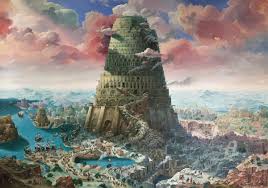 The Bible plays upon the name for Babel, and links it with the Hebrew word for confusion, balal. It says this was a veritable Babel of confusion. It is interesting that the name Babel means "the gate of God." That is what man named the tower. But in the ultimate outcome, Babel became the place of confusion. "The gate of God," in man's eyes, becomes confusion (balal) in the eyes of God. Since that day men have been divided by this confusion of tongues.
The Bible plays upon the name for Babel, and links it with the Hebrew word for confusion, balal. It says this was a veritable Babel of confusion. It is interesting that the name Babel means "the gate of God." That is what man named the tower. But in the ultimate outcome, Babel became the place of confusion. "The gate of God," in man's eyes, becomes confusion (balal) in the eyes of God. Since that day men have been divided by this confusion of tongues.
It is most striking that the confusion of tongues is most evident, even today, in the Hamitic families of earth. Linguists know that most of the languages of earth can be gathered into family groups (e.g., the Indo-European family of languages), and in the Japhetic line and the Semitic line they are quite closely allied; it is not difficult to group those various tongues. But in the Hamitic languages all is utter confusion. Tribes of people, growing up close by one another, have completely different languages. It still persists into this day, and it still divides mankind. We are all aware of the attempts to overcome this with awkward devices of translation. The United Nations cannot even meet together without mechanical gadgets of translation by means of which they can understand one another.
We think we have solved this confusion by translating one language into another, but any linguist knows that language is much deeper than words; it is a basic, fundamental element, reflecting the thought of life and cultural pattern of a people. Merely to know the words of a man's language by no means guarantees that you can communicate with the man. This confusion of language represents a loss of basic understanding between peoples, the loss of the ability to communicate at the deepest levels of thought...The impressive thing to me is that man is still haunted today by the lack of unity. He feels the need for it. He feels that if we can only get together, then, with our technological abilities, if we can just cooperate, we can do anything. Is that not the dream that hangs over humanity? If we can merge -- this is the day of the merger, corporations are merging, nations are merging, companies are merging, churches are merging -- if we can just become one great community again, then, with our technological excellence we can master the earth. The dream still endures, but God still scatters. God yet continues the confusion of tongues.
This may be hard for the Wycliffe translator who is seeking to put Scripture into the various languages of the earth, but, nevertheless, it is the kindness of God that confuses the speech of men. It is God's way of preventing the ultimate catastrophe. When man at last gets together again, and, under the illusion of technical ability, thinks he can master all the great and intricate mechanisms of life, we will have achieved the ultimate disaster.
This is why God continues to humble men everywhere, to scatter, to humiliate, to bring low the proud. Why? Because, as Jesus said in the opening words of the Sermon on the Mount,
"Blessed are the poor in spirit [the man who has nothing, the man who has lost everything upon which he can depend, outside and inside himself) for theirs is the kingdom of heaven." (Matthew 5:3 RSV). When you no longer depend on anything in you, then God is ready to give you everything he possesses: That is the basic message of the Christian faith. (Ray Stedman)
|

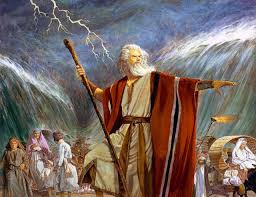
Remnant Rescue, Example 4: The Exodus of Israel from Egypt
“Now when the people complained, it displeased the LORD; for the LORD heard it,and His anger was aroused. So the fire of the LORD burned among them, and consumed some in the outskirts of the camp. Then the people cried out to Moses, and when Moses prayed to the LORD, the fire was quenched. So he called the name of the place Taberah, because the fire of the LORD had burned among them.
Now the mixed multitude who were among them yielded to intense craving; so the children of Israel also wept again and said: “Who will give us meat to eat? “We remember the fish which we ate freely in Egypt, the cucumbers, the melons, the leeks, the onions, and the garlic; “but now our whole being is dried up; there is nothing at all except this manna before our eyes!” Now the manna was like coriander seed, and its color like the color of bdellium. The people went about and gathered it, ground it on millstones or beat it in the mortar, cooked it in pans, and made cakes of it; and its taste was like the taste of pastry prepared with oil. And when the dew fell on the camp in the night, the manna fell on it.
Then Moses heard the people weeping throughout their families, everyone at the door of his tent; and the anger of the LORD was greatly aroused; Moses also was displeased. So Moses said to the LORD, “Why have You afflicted Your servant? And why have I not found favor in Your sight, that You have laid the burden of all these people on me? “Did I conceive all these people? Did I beget them, that You should say to me, ‘Carry them in your bosom, as a guardian carries a nursing child,’ to the land which You swore to their fathers? “Where am I to get meat to give to all these people? For they weep all over me, saying, ‘Give us meat, that we may eat.’ “I am not able to bear all these people alone, because the burden is too heavy for me. “If You treat me like this, please kill me here and now--if I have found favor in Your sight--and do not let me see my wretchedness!” (Numbers 11:1-15)
Seventy Israelites moved to Egypt to escape from a middle-eastern drought. Joseph led them. The Jews multiplied in Egypt to about 3 million strong in only 430 years, leaving to return home to Israel in 1585 BC. Moses, their heroic leader, wrestled them for 40 years on the return journey. They were not always cooperative! The Exodus of the Jews from Egypt was not a scattering obviously, nor was their entrance into the promised land forty years later. Notes: The Exodus Papers.
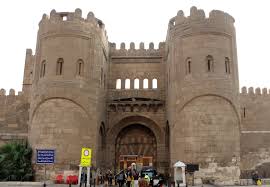

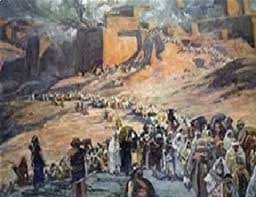 Dispersal Example 5: The Babylonian Captivity of Israel
Dispersal Example 5: The Babylonian Captivity of Israel
“Why has this people slidden back,
Jerusalem, in a perpetual backsliding?
They hold fast to deceit,
They refuse to return. I listened and heard,
But they do not speak aright.
No man repented of his wickedness,
Saying, ‘What have I done?’
Everyone turned to his own course,
As the horse rushes into the battle.
“Even the stork in the heavens
Knows her appointed times;
And the turtledove, the swift, and the swallow observe the time of their coming.
But My people do not know the judgment of the LORD.
“How can you say, ‘We are wise,
And the law of the LORD is with us’?
Look, the false pen of the scribe certainly works falsehood.
The wise men are ashamed,
They are dismayed and taken.
Behold, they have rejected the word of the LORD;
So what wisdom do they have?
Therefore I will give their wives to others,
And their fields to those who will inherit them;
Because from the least even to the greatest
Everyone is given to covetousness;
From the prophet even to the priest
Everyone deals falsely.
For they have healed the hurt of the daughter of My people slightly,
Saying, ‘Peace, peace!’
When there is no peace.
Were they ashamed when they had committed abomination?
No! They were not at all ashamed,
Nor did they know how to blush.
Therefore they shall fall among those who fall;
In the time of their punishment
They shall be cast down,” says the LORD.
“I will surely consume them,” says the LORD.
“No grapes shall be on the vine,
Nor figs on the fig tree,
And the leaf shall fade;
And the things I have given them shall pass away from them.” ” (Jeremiah 8:5-13)
“I Myself will fight against you with an outstretched hand and with a strong arm, even in anger and fury and great wrath. “I will strike the inhabitants of this city, both man and beast; they shall die of a great pestilence. “And afterward,” says the LORD, “I will deliver Zedekiah king of Judah, his servants and the people, and such as are left in this city from the pestilence and the sword and the famine, into the hand of Nebuchadnezzar king of Babylon, into the hand of their enemies, and into the hand of those who seek their life; and he shall strike them with the edge of the sword. He shall not spare them, or have pity or mercy.” “Now you shall say to this people, ‘Thus says the LORD: “Behold, I set before you the way of life and the way of death.“ (Jeremiah 21:5-8)
From Wikipedia: The Babylonian captivity or Babylonian exile is the period in Jewish history during which a number of people from the ancient Kingdom of Judah were captives in Babylon, the capital of the Neo-Babylonian Empire. After the Battle of Carchemish in 605 BCE, King Nebuchadnezzar of Babylon besieged Jerusalem, resulting in tribute being paid by King Jehoiakim. Jehoiakim refused to pay tribute in Nebuchadnezzar's fourth year, which led to another siege in Nebuchadnezzar's seventh year, culminating with the death of Jehoiakim and the exile to Babylonia of King Jeconiah, his court and many others; Jeconiah's successor Zedekiah and others were exiled in Nebuchadnezzar's eighteenth year; a later deportation occurred in Nebuchadnezzar's twenty-third year. The dates, numbers of deportations, and numbers of deportees given in the biblical accounts vary. These deportations are dated to 597 BCE for the first, with others dated at 587/586 BCE, and 582/581 BCE respectively.
After the fall of Babylon to the Persian king Cyrus the Great in 539 BCE, exiled Judeans were permitted to return to Judah. According to the biblical book of Ezra, construction of the Second Temple in Jerusalem began around 537 BCE. All these events are considered significant in Jewish history and culture, and had a far-reaching impact on the development of Judaism.
Archaeological studies have revealed that not all of the population of Judah was deported, and that, although Jerusalem was utterly destroyed, other parts of Judah continued to be inhabited during the period of the exile. The return of the exiles was a gradual process rather than a single event, and many of the deportees or their descendants did not return, becoming the ancestors of the Iraqi Jews.
Biblical accounts of the exile:
In the late 7th century BCE, the Kingdom of Judah was a client state of the Assyrian empire. In the last decades of the century, Assyria was overthrown by Babylon, an Assyrian province. Egypt, fearing the sudden rise of the Neo-Babylonian empire, seized control of Assyrian territory up to the Euphrates river in Syria, but Babylon counter-attacked. In the process Josiah, the king of Judah, was killed in a battle with the Egyptians at the Battle of Megiddo (609 BCE).
After the defeat of Pharaoh Necho's army by the Babylonians at Carchemish in 605 BCE, Jehoiakim began paying tribute to Nebuchadnezzar II of Babylon. Some of the young nobility of Judah were taken to Babylon.
In the following years, the court of Jerusalem was divided into two parties, one supporting Egypt, the other Babylon. After Nebuchadnezzar was defeated in battle in 601 BCE by Egypt, Judah revolted against Babylon, culminating in a three-month siege of Jerusalem beginning in late 598 BCE. Jehoiakim, the king of Judah, died during the siege and was succeeded by his son Jehoiachin (also called Jeconiah) at the age of eighteen. The city fell on 2 Adar (March 16) 597 BCE, and Nebuchadnezzar pillaged Jerusalem and its Temple and took Jeconiah, his court and other prominent citizens (including the prophet Ezekiel) back to Babylon. Jehoiakim's uncle Zedekiah was appointed king in his place, but the exiles in Babylon continued to consider Jeconiah as their Exilarch, or rightful ruler.
Despite warnings by Jeremiah and others of the pro-Babylonian party, Zedekiah revolted against Babylon and entered into an alliance with Pharaoh Hophra. Nebuchadnezzar returned, defeated the Egyptians, and again besieged Jerusalem, resulting in the city's destruction in 587 BCE. Nebuchadnezzar destroyed the city wall and the Temple, together with the houses of the most important citizens. Zedekiah and his sons were captured and the sons were executed in front of Zedekiah, who was then blinded and taken to Babylon with many others (Jeremiah 52:10–11). Judah became a Babylonian province, called missing years in the Jewish calendar, rabbinic sources place the date of the destruction of the First Temple at 3338 HC (423 BCE) or 3358 HC (403 BCE)).
The first governor appointed by Babylon was Gedaliah, a native Judahite; he encouraged the many Jews who had fled to surrounding countries such as Moab, Ammon and Edom to return, and he took steps to return the country to prosperity. Some time later, a surviving member of the royal family assassinated Gedaliah and his Babylonian advisors, prompting many refugees to seek safety in Egypt. By the end of the second decade of the 6th century, in addition to those who remained in Judah, there were significant Jewish communities in Babylon and in Egypt; this was the beginning of the later numerous Jewish communities living permanently outside Judah in the Jewish Diaspora.
According to the book of Ezra, the Persian Cyrus the Great ended the exile in 538 BCE, the year after he captured Babylon. The exile ended with the return under Zerubbabel the Prince (so-called because he was a descendant of the royal line of David) and Joshua the Priest (a descendant of the line of the former High Priests of the Temple) and their construction of the Second Temple in the period 521–516 BCE.


Example 6: The Scattering of the Disciples of Jesus
“Then they came to a place which was named Gethsemane; and He said to His disciples, “Sit here while I pray.” And He took Peter, James, and John with Him, and He began to be troubled and deeply distressed. Then He said to them, “My soul is exceedingly sorrowful, even to death. Stay here and watch.” He went a little farther, and fell on the ground, and prayed that if it were possible, the hour might pass from Him. And He said, “Abba, Father, all things are possible for You. Take this cup away from Me; nevertheless, not what I will, but what You will.” Then He came and found them sleeping, and said to Peter, “Simon, are you sleeping? Could you not watch one hour? “Watch and pray, lest you enter into temptation. The spirit indeed is willing, but the flesh is weak.” Again He went away and prayed, and spoke the same words. And when He returned, He found them asleep again, for their eyes were heavy; and they did not know what to answer Him. Then He came the third time and said to them, “Are you still sleeping and resting? It is enough! The hour has come; behold, the Son of Man is being betrayed into the hands of sinners. “Rise, let us be going. See, My betrayer is at hand.” And immediately, while He was still speaking, Judas, one of the twelve, with a great multitude with swords and clubs, came from the chief priests and the scribes and the elders.! Now His betrayer had given them a signal, saying, “Whomever I kiss, He is the One; seize Him and lead Him away safely.” As soon as he had come, immediately he went up to Him and said to Him, “Rabbi, Rabbi!” and kissed Him. Then they laid their hands on Him and took Him. And one of those who stood by drew his sword and struck the servant of the high priest, and cut off his ear. Then Jesus answered and said to them, “Have you come out, as against a robber, with swords and clubs to take Me “I was daily with you in the temple teaching, and you did not seize Me. But the Scriptures must be fulfilled.”
Then they all forsook Him and fled.
Now a certain young man followed Him, having a linen cloth thrown around his naked body. And the young men laid hold of him, and he left the linen cloth and fled from them naked. And they led Jesus away to the high priest; and with him were assembled all the chief priests, the elders, and the scribes. (Mark 13:32-53)
Ray Stedman's message Smite the Shepherd on Mark 14:16-42 in excellent.

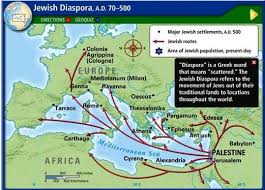
Example 7: The Great Diaspora of Israel
Now Saul was consenting to his (Stephen’s) death. At that time a great persecution arose against the church which was at Jerusalem; and they were all scattered throughout the regions of Judea and Samaria, except the apostles. And devout men carried Stephen to his burial, and made great lamentation over him. As for Saul, he made havoc of the church, entering every house, and dragging off men and women, committing them to prison. Therefore those who were scattered went everywhere preaching the word. Then Philip went down to the city of Samaria and preached Christ to them. And the multitudes with one accord heeded the things spoken by Philip, hearing and seeing the miracles which he did. For unclean spirits, crying with a loud voice, came out of many who were possessed; and many who were paralyzed and lame were healed. And there was great joy in that city.” (Acts 8:1-8)
“Now about that time Herod the king stretched out his hand to harass some from the church. Then he killed James the brother of John with the sword. And because he saw that it pleased the Jews, he proceeded further to seize Peter also. Now it was during the Days of Unleavened Bread. So when he had arrested him, he put him in prison, and delivered him to four squads of soldiers to keep him, intending to bring him before the people after Passover. Peter was therefore kept in prison, but constant prayer was offered to God for him by the church.” (Acts 11:1-55)
The church of Jesus Christ has always flourished when undergoing persecution! Such was the case of the church at ancient Smyrna,
From Ray Stedman: "The name Smyrna means "myrrh." It is a very fitting name because myrrh is a perfume, the fragrance of which is released by crushing. Here was a church that was being crushed through persecution. It was tough to be a Christian in Smyrna because they had to live constantly between two extremes. There was within the church a rich and loving fellowship which must have greatly warmed their hearts and strengthened their faith, but outside, in the city, they faced continuous cruel and persistent hostility. Thus, the Christians of Smyrna lived within these two extremes.
But notice how the Lord reveals himself to them. He says, "I am the First and the Last. I am the one who died and who lives." Those are extremes: First and last; death and life. Jesus presents himself as the Lord of the extremes. He encompasses all the forces and events between these two extremes. Remember that at the giving of the Great Commission he said to his disciples, "All power in heaven and on earth has been given unto me," (Matthew 28:18 KJV). He is Lord of all heavenly and earthly forces. It must have been a great encouragement to the Christians at Smyrna to receive this word from their Lord.
There is an ascending scale of troubles harassing the church. The first thing the Lord says is, "I know your afflictions." The Greek word means distresses. It is a picture of crushing, unending pressure upon them. We can best understand what that would be like if we remember what we have read about the Holocaust in Germany, and the continual pressures that the Jews faced daily under the Nazi regime. Every day they were hounded and harassed on every side. They were humiliated and attacked without mercy. It is the kind of distress these Christians in Smyrna were enduring. Perhaps we could update it a bit by likening it to the suffering of the churches of Eastern Europe under the hard-line Communist regime.
The second thing Jesus says is, I know your poverty: "I know your afflictions and your poverty -- yet you are rich." We do not know exactly what made them poor. Smyrna was a prosperous city, but it may have been that this poverty was caused by the persecutions they were experiencing. Their homes perhaps had been pillaged; their possessions taken away. This was common in the early church in times of persecution. Perhaps they had to resort to menial work, and to eat cheap food to get by. Yet the Lord says their fellowship within the congregation and their families was rich indeed."
After the followers of Jesus were scattered as seen in the above quotes from the Book of Acts, momentous suffering fell upon the people of Israel. Jesus had foreseen this forty years earlier.
Then He said to them, “Nation will rise against nation, and kingdom against kingdom. And there will be great earthquakes in various places, and famines and pestilences; and there will be fearful sights and great signs from heaven. But before all these things, they will lay their hands on you and persecute you, delivering you up to the synagogues and prisons. You will be brought before kings and rulers for My name’s sake. But it will turn out for you as an occasion for testimony. Therefore settle it in your hearts not to meditate beforehand on what you will answer; for I will give you a mouth and wisdom which all your adversaries will not be able to contradict or resist. You will be betrayed even by parents and brothers, relatives and friends; and they will put some of you to death. And you will be hated by all for My name’s sake. But not a hair of your head shall be lost. By your patience possess your souls.
“But when you see Jerusalem surrounded by armies, then know that its desolation is near. Then let those who are in Judea flee to the mountains, let those who are in the midst of her depart, and let not those who are in the country enter her. For these are the days of vengeance, that all things which are written may be fulfilled. But woe to those who are pregnant and to those who are nursing babies in those days! For there will be great distress in the land and wrath upon this people. And they will fall by the edge of the sword, and be led away captive into all nations. And Jerusalem will be trampled by Gentiles until the times of the Gentiles are fulfilled. (Luke 21:5-24)
Jerusalem was sacked and plundered in AD 70 by Roman General Titus (soon to be the next Caesar), in AD 70. He destroyed the city and murdered the inhabitants, bringing terrible suffering and vast destruction, (Josephus). The Second Temple was set afire, soldiers tore every stone apart to get melted gold. The Golden Menorah and sacred vessels were carried to Rome. (See Wikipedia).
In 135 Emperor Hadrian undertook rebuilding of Jerusalem as "Aelia Capitolina" provoking unsuccessful Bar Kochba revolt in 135 by devout Jews. Hadrian then erected a Temple of Jupiter on Temple Mount and statue of himself facing east in front. Jewish attempt to build Third Temple fails. See the Temple Mount web site.
For 2000 years the land of Israel was empty and desolate while the Jewish people were scattered abroad in the nations of the world, enduring terrible hardship and suffering. The land lay empty and desolate. The Jewish Diaspora has been forgotten by most people living today, but God's eye of protection has remained on His chosen people. The nation was reborn on May 15, 1948 after events transpiring in World Wars One and Two resulted in the allocation
of a tiny plot of land as a homeland.
Ezekiel the Prophet had spoken of the Jewish Diaspora six centuries before it happened:
Again the word of the Lord came to me, saying, “Son of man, your brethren, your relatives, your countrymen, and all the house of Israel in its entirety, are those about whom the inhabitants of Jerusalem have said, ‘Get far away from the Lord; this land has been given to us as a possession.’ Therefore say, ‘Thus says the Lord God: “Although I have cast them far off among the Gentiles, and although I have scattered them among the countries, yet I shall be a little sanctuary (miqdash, synagogue) for them in the countries where they have gone.” ’ Therefore say, ‘Thus says the Lord God: “I will gather you from the peoples, assemble you from the countries where you have been scattered, and I will give you the land of Israel.” ’ And they will go there, and they will take away all its detestable things and all its abominations from there. Then I will give them one heart, and I will put a new spirit within them, and take the stony heart out of their flesh, and give them a heart of flesh, that they may walk in My statutes and keep My judgments and do them; and they shall be My people, and I will be their God. But as for those whose hearts follow the desire for their detestable things and their abominations, I will recompense their deeds on their own heads,” says the Lord God.(Ezekiel 11:14-21)

Example 8: The Martyrdom of the Apostles and terrible suffering fell upon the Jewish nation
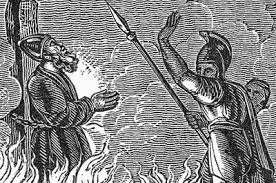 Excerpt from The Martyrdom of Polycarp
Excerpt from The Martyrdom of Polycarp
Even so he could have escaped to another farm, but he did not wish to do so, saying, "God's will be done." Thus, when he heard of their arrival, he went downstairs and talked with them, while those who looked on marveled at his age and constancy, and at how there should be such zeal over the arrest of so old a man. Straightway he ordered food and drink, as much as they wished, to be set before them at that hour, and he asked them to give him an hour so that he might pray undisturbed.
And when they consented, he stood and prayed---being so filled with the grace of God that for two hours he could not hold his peace, to the amazement of those who heard. And many repented that they had come to get such a devout old man. When at last he had finished his prayer, in which he remembered all who had met with him at any time, both small and great, both those with and those without renown, and the whole Catholic Church throughout the world, the hour of departure having come, they mounted him on an ass and brought him into the city.
It was a great Sabbath. And there the chief of the police, Herod, and his father, Nicetas, met him and transferred him to their carriage, and tried to persuade him, as they sat beside him, saying, "What harm is there to say, 'Lord Caesar,' and to offer incense and all that sort of thing and to save yourself?"
At first first he not answer them. But when they persisted, he said, "I am not going to do what you advise me."
Then when they failed to persuade him, they uttered dire threats and made him get out with such speed that in dismounting from the carriage he bruised his shin. But without turning around, as though nothing had happened, he proceeded swiftly, and was led into the arena, there being such a tumult in the arena that no one could be heard. But as Polycarp was entering the arena, a voice from heaven came to him, saying, "Be strong, Polycarp, and play the man." No one saw the one speaking, but those of our people who were present heard the voice.
And when finally he was brought up, there was a great tumult on hearing that Polycarp had been arrested. Therefore, when he was brought before him, the proconsul asked him if he were Polycarp. And when he confessed that he was, he tried to persuade him to deny [the faith], saying, "Have respect to your age"-and other things that customarily follow this, such as, "Swear by the fortune of Caesar; change your mind; say, 'Away with the atheists!'"
But Polycarp looked with earnest face at the whole crowd of lawless heathen in the arena, and motioned to them with his hand. Then, groaning and looking up to heaven, he said, "Away with the atheists!"
But the proconsul was insistent and said: "Take the oath, and I shall release you. Curse Christ."
Polycarp said: "Eighty-six years I have served him, and he never did me any wrong. How can I blaspheme my King who saved me?"

Example 9: The Nazi Holocaust (Shoah)
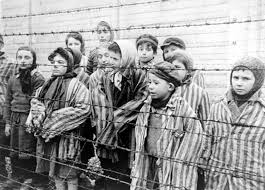
"On our recent trip to Israel we visited the great memorial in Jerusalem that the Jews have erected to recall the Holocaust. There, the terrible, hideous tortures to which the Jews were subjected -- the concentration camps, the gas chambers of Buchenwald and Auschwitz and other places -- are well remembered. The whole record, the newspaper reports, the fearsome scenes which the Allies found when they liberated these camps, etc., are all on display, a testimony that none of it will ever be forgotten. But what is even more touching is the new memorial that has been erected to the children of the Holocaust.
Visiting this memorial was one of the most moving experiences of my life. The hall is almost totally dark, lighted only by a few candles, but there are hundreds of mirrors that reflect the candles so that the impression given is of thousands of candles burning.
There in the gloom I felt as though I was standing at the judgment bar of God! Hidden voices endlessly call out the names of children who were tortured and murdered by the Nazis. It is Israel's way of saying that these children will never be forgotten. Not one injustice, not one humiliation, not one act of pain or torture will ever be forgotten. God is telling us the same thing here. He will bring affliction to those who afflict, and rest and relief to those afflicted. When will that be?" (Ray Stedman)
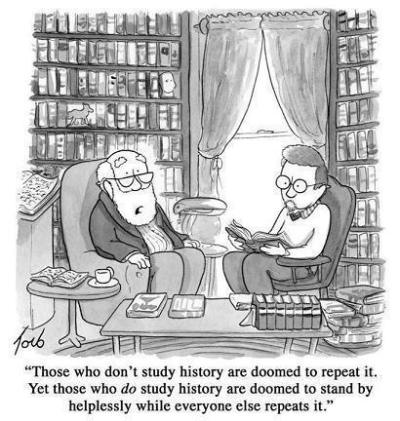
No one studying human history and the story of how God works in history should remain illiterate concerning the Tanach (the Old Testament) or the Holocaust!

Example 10: The Soon Rapture of the Church
It hasn't happened yet, but the exact date is written on the great calendar of the LORD God.
Any day now!
"But I do not want you to be ignorant, brethren, concerning those who have fallen asleep, lest you sorrow as others who have no hope. For if we believe that Jesus died and rose again, even so God will bring with Him those who sleep in Jesus. For this we say to you by the word of the Lord, that we who are alive and remain until the coming of the Lord will by no means precede those who are asleep. For the Lord Himself will descend from heaven with a shout, with the voice of an archangel, and with the trumpet of God. And the dead in Christ will rise first. Then we who are alive and remain shall be caught up (harpazo) together with them in the clouds to meet the Lord in the air. And thus we shall always be with the Lord. Therefore comfort one another with these words" (1 Thessalonians 4:13-18)
God is about to remove from planet earth perhaps ten or twenty percent of earth's residents. They will be take to an orbiting satellite, called "the New Jerusalem." Will the departing ones be missed by those who are "left behind"? God knows. I believe "probably not." Passport needed to fly away? A personal relationship with the living lord Jesus Christ is needed.
From Ray Stedman: "First, the Thessalonians had clearly been expecting the return of Jesus before any of them died. This was a moment-by-moment expectancy in the early church. 1st century Christians never entertained the thought that death would occur for them. They believed the Lord was coming within days, or weeks at the most. In the first chapter of this letter Paul commends the Thessalonians for "waiting for God's Son from heaven," (1 Thessalonians 1:10). That is what they were looking for.
Jesus' own words suggest that this would be the case. All his statements about his return were addressed to people who were still alive, and he speaks of them as though they would still be alive when he returned. To his disciples he said, "Watch, for you do not know the hour. Be ready," (Matthew 24:42, 25:13). He used terms like "be not deceived," and "the Son of Man will come at an hour that you think not," (Matthew 24:44, Luke 12:40). There is no mention of the impact of his coming upon those who had already died.
The second thing we should recall is that the Thessalonians, like us today, were projecting the sequences of time into eternity. We all struggle with the concept of eternity. We tend to think of it as time going on endlessly; that, as is the case here on earth, we must wait for certain events which are yet future. We think that is how it will be in heaven, despite the fact that the Word of God seeks to demonstrate that time and eternity are two different things—they are not the same thing. Time has sequences: it has past, present, and future. But eternity has only one dimension: it is present—now. We struggle with that, as the Thessalonians also did.
In time, we are all here in one building this morning. We are all locked into a segment of time together; we are all feeling the same temperature, etc. But that is true only of our bodies. That says nothing about where our minds have been. Some of you have not been here for the last half hour! It would be interesting to know where everybody had been during the service this morning. Minds are not limited to space, or time, or sequence. They can go anywhere and experience anything at any time. Eternity is much more like that. That is why we have great difficulty understanding these prophetic passages in terms of time when they are really eternal events.
Although I believe that Paul knew the differences between time and eternity, he reassures the Thessalonians without becoming abstruse or pedantic, explaining that the living and the dead will be together when our Lord returns. That is the point at issue. He says, in effect, "Yes, you will see your loved ones immediately when the Lord returns. Whether you join that event when you die, or whether the Lord comes while you are yet alive, your loved ones will be with him." That is the point he is making. He then goes on to give them a new revelation.
For this we declare to you by the word of the Lord, (1 Thessalonians 4:15a RSV)
I take those words to mean that this is something he had not taught them when he was in Thessalonica. He had taught them about Jesus' death and resurrection and how that would affect them, but he did not give them details of time and circumstance of his coming again. Now the apostle is revealing further truth.
...that we who are alive, who are left until the coming of the Lord, shall not precede those who have fallen asleep. (1 Thessalonians 4:15b RSV)
That sheds further light on the subject. "We will all be together," says Paul, "do not worry about that. You will find your loved ones again when the Lord returns." Then, fourth, he gives them the details of how it will happen.
For the Lord himself will descend from heaven with a cry of command, with the archangel's call, and with the sound of the trumpet of God. And the dead in Christ will rise first; then we who are alive, who are left, shall be caught up together with them in the clouds to meet the Lord in the air; and so we shall always be with the Lord. (1 Thessalonians 4:16-17 RSV)
Paul calls this "the coming of the Lord." Many people, including certain notable Bible scholars, are confused on this because they tend to regard the coming of the Lord as though it were a single event, an immediate and once-for-all appearing. But if we carefully study the Scriptures (and we will see evidence for this in a moment), the coming of the Lord is a series of events. This series has a dramatic beginning, as Paul describes here, with Jesus appearing to take his living and dead saints to be with him. And it has an even more dramatic ending when, as the Lord himself said, he would manifest himself to the entire world: "They shall see the Son of Man coming in the clouds of glory with all his heavenly hosts," (Matthew 24:30, Mark 13:26, Luke 21:27). That is a different event from the one here described. You cannot make those fit together. In between them is a period of time during which Jesus is present on the earth though not always visibly so.
That is what Scripture calls the "presence," which is the Greek word parousia. That is a better translation of this word "coming." When Scripture talks about the coming of the Lord, it sometimes looks at the beginning of that series, sometimes it looks at the end of it, and sometimes, as in the book of Revelation, it is looking at what is going on between the two ends. We must train ourselves to think in those terms. The parousia of Jesus is a series of events.
Daniel, the Old Testament prophet, says that it is a week of years long, i.e. seven years in duration. One event is at the beginning; another event is at the end; and in between the Lord will be present on the earth behind the scenes, as it were, very much as he was in the days after his resurrection. For forty days Jesus was here on earth. He appeared to the disciples in Jerusalem and in Galilee. People heard reports that he was around, but nobody could find him except when he chose to be seen. That is the same condition that will prevail on earth during this time of the coming of the Lord, the "presence" of Jesus. If we understand that, it will help us greatly to comprehend what is described here.
This is all suggested by the three sounds which the apostle connects with this initial appearing of Jesus. It is the Lord himself who will come. That always warms my heart. He is not going to send Michael, the archangel, or Gabriel, or Moroni, or anyone else. He is coming himself. "The Lord himself shall descend from heaven with a cry of command." Who is that cry addressed to? These three sounds affect different groups. Scripture gives the answer to this. Jesus himself had said in John 5, "The hour is coming and now is ..." (Observe the blending of time and eternity there. It is coming in time; it now is in eternity.) "The hour is coming and now is when all those that are in the grave shall hear the voice of the Son of Man and shall come forth," (John 5:25). Jesus had stood before the tomb of Lazarus and cried with a loud voice, "Lazarus, come forth" (John 11:43), and to the amazement of the crowd the dead man appeared in the doorway of the tomb, still wrapped in his grave clothes. He heard the voice of the Son of God, and he came forth. As many of the commentators have pointed out, if Jesus had not said "Lazarus," he would have emptied the graveyard! But the hour is coming when all the dead shall hear the voice of the Son of God and come forth! That is what Paul is talking about here. The cry of command is addressed to the dead, to those in the tombs who had fallen asleep in Jesus.
The second sound is the archangel's call. The only angel in the Bible called an archangel is Michael. Though Gabriel is a great angel he is not called an archangel in the Scripture. In the first two verses of Daniel 12 we read that an angel said to Daniel, "At that time shall arise Michael, the great prince who has charge of your people," (Daniel 12:1 RSV). "Your people" means Israel; Michael is always connected with Israel. Michael shall stand up, and then there shall be a resurrection. Those who are in the tombs will come forth, Daniel was told. Also, the living nation of Israel will be summoned to a new relationship with God. Details of this event concern the 144,000 Israelites, twelve thousand from each of the twelve tribes of Israel, who are described in the seventh and fourteenth chapters of Revelation. These will be called into a new relationship with Jesus, to follow him wherever he goes on earth during the time of his presence. He is invisible to the world, but visible to them. That all begins when Jesus returns for his church and the archangel calls Israel into a new relationship with the Lord.
The third sound is the great trumpet call such as was heard at Mt. Sinai when the Law was given. Then the trumpet sounded so loudly that the people cried out to Moses, "Stop it! We cannot stand it." I do not think the world will hear this call; only those to whom it is addressed will hear it. Paul identifies those in First Corinthians 15, the great resurrection chapter. There, he says, "Behold I tell you a mystery. We shall not all sleep (i.e. not all believers will go to heaven by death) but we shall all be changed, in a moment, in the twinkling of an eye, at the last trump," (1 Corinthians 15:51-52a RSV). Some church nurseries, referring to babies, post that verse on the door: "We shall not all sleep, but we shall all be changed!" But this verse is especially addressed to living saints. "We shall not all sleep." We are not all going to die. Paul includes himself in that. He felt he would be part of it. "We shall not all sleep, but we shall all be changed." That is the important thing. "We shall all be changed, in a moment, in the twinkling of an eye, at the last trump." When that trumpet sound reaches the ears of living believers, although it will be inaudible to the world, they will be changed and caught up to be with the Lord.
The fifth thing to note, then, is the comfort that this is intended to bring.
Therefore comfort one another with these words. (1 Thessalonians 4:18 RSV)
The comforting hope is that we shall all be together as the great family of God and forever be with the Lord. That covers everything the church does from then on. Whatever it is, it is done with the Lord. As I have suggested, the Lord will actually remain on earth, behind the scenes, directing the events described in the dramatic portrayal of the book of Revelation. The church will be with him, invisibly participating in directing the course of the Great Tribulation, but not going through it because they are no longer living on earth but are transformed saints affecting the events on earth. The critical point which the apostle stresses is that we shall see Jesus face to face. That has always been a source of great comfort to believers through the centuries. (Ray Stedman)

Restoration, Regathering, Healing
The Ezekiel 39 End Time Regathering of the Jews

“I will set My glory among the nations; all the nations shall see My judgment which I have executed, and My hand which I have laid on them. “So the house of Israel shall know that I am the LORD their God from that day forward.
“The Gentiles shall know that the house of Israel went into captivity for their iniquity; because they were unfaithful to Me, therefore I hid My face from them. I gave them into the hand of their enemies, and they all fell by the sword. “According to their uncleanness and according to their transgressions I have dealt with them, and hidden My face from them.”
’“Therefore thus says the Lord GOD: ‘Now I will bring back the captives of Jacob, and have mercy on the whole house of Israel; and I will be jealous for My holy name--‘after they have borne their shame, and all their unfaithfulness in which they were unfaithful to Me, when they dwelt safely in their own land and no one made them afraid. ‘When I have brought them back from the peoples and gathered them out of their enemies’ lands, and I am hallowed in them in the sight of many nations, ‘then they shall know that I am the LORD their God, who sent them into captivity among the nations, but also brought them back to their land, and left none of them captive any longer. ‘And I will not hide My face from them anymore; for I shall have poured out My Spirit on the house of Israel,’ says the Lord GOD.” (Ezekiel 39:21-29)
The Coming Middle East Invasion: The War of Gog and Magog

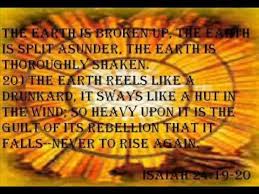
Isaiah 24
“Behold, the LORD makes the earth empty and makes it waste,
Distorts its surface
And scatters abroad its inhabitants. And it shall be:
As with the people, so with the priest;
As with the servant, so with his master;
As with the maid, so with her mistress;
As with the buyer, so with the seller;
As with the lender, so with the borrower;
As with the creditor, so with the debtor.
The land shall be entirely emptied and utterly plundered,
For the LORD has spoken this word.
The earth mourns and fades away,
The world languishes and fades away;
The haughty people of the earth languish.
The earth is also defiled under its inhabitants,
Because they have transgressed the laws,
Changed the ordinance,
Broken the everlasting covenant.
Therefore the curse has devoured the earth,
And those who dwell in it are desolate.
Therefore the inhabitants of the earth are burned,
And few men are left.
The new wine fails, the vine languishes,
All the merry-hearted sigh.
The mirth of the tambourine ceases,
The noise of the jubilant ends,
The joy of the harp ceases.
They shall not drink wine with a song;
Strong drink is bitter to those who drink it.
The city of confusion is broken down;
Every house is shut up, so that none may go in.
There is a cry for wine in the streets,
All joy is darkened,
The mirth of the land is gone. In the city desolation is left,
And the gate is stricken with destruction.
When it shall be thus in the midst of the land among the people,
It shall be like the shaking of an olive tree,
Like the gleaning of grapes when the vintage is done.
They shall lift up their voice, they shall sing;
For the majesty of the LORD
They shall cry aloud from the sea.
Therefore glorify the LORD in the dawning light,
The name of the LORD God of Israel in the coastlands of the sea.
From the ends of the earth we have heard songs:
“Glory to the righteous!”
But I said, “I am ruined, ruined!
Woe to me!
The treacherous dealers have dealt treacherously,
Indeed, the treacherous dealers have dealt very treacherously.”
Fear and the pit and the snare
Are upon you, O inhabitant of the earth. And it shall be
That he who flees from the noise of the fear
Shall fall into the pit,
And he who comes up from the midst of the pit
Shall be caught in the snare;
For the windows from on high are open,
And the foundations of the earth are shaken.
The earth is violently broken,
The earth is split open,
The earth is shaken exceedingly.
The earth shall reel to and fro like a drunkard,
And shall totter like a hut;
Its transgression shall be heavy upon it,
And it will fall, and not rise again.
It shall come to pass in that day
That the LORD will punish on high the host of exalted ones,
And on the earth the kings of the earth.
They will be gathered together,
As prisoners are gathered in the pit,
And will be shut up in the prison;
After many days they will be punished.
Then the moon will be disgraced
And the sun ashamed;
For the LORD of hosts will reign
On Mount Zion and in Jerusalem
And before His elders, gloriously. (Isaiah 24)


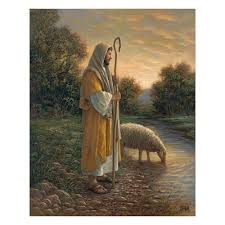
Jesus the Great Shepherd
“Truly, truly, I say to you, he who does not enter the sheepfold by the door, but climbs up some other way, the same is a thief and a robber. “But he who enters by the door is the shepherd of the sheep. “To him the doorkeeper opens, and the sheep hear his voice; and he calls his own sheep by name and leads them out. “And when he brings out his own sheep, he goes before them; and the sheep follow him, for they know his voice. “Yet they will by no means follow a stranger, but will flee from him, for they do not know the voice of strangers.”Jesus used this illustration, but they did not understand the things which He spoke to them.
Then Jesus said to them again, “Most assuredly, I say to you, I am the door of the sheep. “All who ever came before Me are thieves and robbers, but the sheep did not hear them. “I am the door. If anyone enters by Me, he will be saved, and will go in and out and find pasture. “The thief does not come except to steal, and to kill, and to destroy. I have come that they may have life, and that they may have it more abundantly. “I am the good shepherd. The good shepherd gives His life for the sheep. “But a hireling, he who is not the shepherd, one who does not own the sheep, sees the wolf coming and leaves the sheep and flees; and the wolf catches the sheep and scatters them. “The hireling flees because he is a hireling and does not care about the sheep. “I am the good shepherd; and I know My sheep, and am known by My own.
“As the Father knows Me, even so I know the Father; and I lay down My life for the sheep. “And other sheep I have which are not of this fold; them also I must bring, and they will hear My voice; and there will be one flock and one shepherd. “Therefore My Father loves Me, because I lay down My life that I may take it again. “No one takes it from Me, but I lay it down of Myself. I have power to lay it down, and I have power to take it again. This command I have received from My Father.”
Therefore there was a division again among the Jews because of these sayings. And many of them said, “He has a demon and is mad. Why do you listen to Him?” Others said, “These are not the words of one who has a demon. Can a demon open the eyes of the blind?” Now it was the Feast of Dedication in Jerusalem, and it was winter. And Jesus walked in the temple, in Solomon’s porch. Then the Jews surrounded Him and said to Him, “How long do You keep us in doubt? If You are the Christ, tell us plainly.”
Jesus answered them, “I told you, and you do not believe. The works that I do in My Father’s name, they bear witness of Me. “But you do not believe, because you are not of My sheep, as I said to you. “My sheep hear My voice, and I know them, and they follow Me. “And I give them eternal life, and they shall never perish; neither shall anyone snatch them out of My hand. “My Father, who has given them to Me, is greater than all; and no one is able to snatch them out of My Father’s hand. “I and My Father are one.” Then the Jews took up stones again to stone Him. Jesus answered them, “Many good works I have shown you from My Father. For which of those works do you stone Me?”
The Jews answered Him, saying, “For a good work we do not stone You, but for blasphemy, and because You, being a Man, make Yourself God.” Jesus answered them, “Is it not written in your law, ‘I said, “You are gods” ’? “If He called them gods, to whom the word of God came (and the Scripture cannot be broken), “do you say of Him whom the Father sanctified and sent into the world, ‘You are blaspheming,’ because I said, ‘I am the Son of God’?
“If I do not do the works of My Father, do not believe Me; “but if I do, though you do not believe Me, believe the works, that you may know and believe that the Father is in Me, and I in Him.” Therefore they sought again to seize Him, but He escaped out of their hand. And He went away again beyond the Jordan to the place where John was baptizing at first, and there He stayed. Then many came to Him and said, “John performed no sign, but all the things that John spoke about this Man were true.” And many believed in Him there. (John 10)


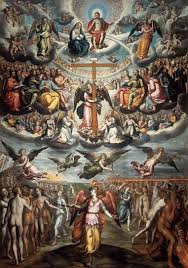
Example 11: The Last Judgment
Then I saw a great white throne and Him who sat on it, from whose face the earth and the heaven fled away. And there was found no place for them. And I saw the dead, small and great, standing before God, and books were opened. And another book was opened, which is the Book of Life. And the dead were judged according to their works, by the things which were written in the books. The sea gave up the dead who were in it, and Death and Hades delivered up the dead who were in them. And they were judged, each one according to his works. Then Death and Hades were cast into the lake of fire. This is the second death. And anyone not found written in the Book of Life was cast into the lake of fire.“ (Revelation 20:11-15)
From Ray Stedman: "This scene hardly needs any comment at all. Earth and heaven flee away, which means it is not on earth but it is a judgment in eternity. The judge is Jesus, not the Father! Jesus himself said, "The Father has committed all judgment to the Son," (John 5:22). So it is he who sits upon this throne of majesty and gathers all the dead before him. There will also be some living people from the millennium who will be there as well for it needs to be determined as to whether their names are in the book of life or not. But judgment will be "according to what each one has done." Deeds reveal what the heart is like. They reveal belief. It is all preserved in God's great library. Books are used as symbols here; we would probably use video tapes. The whole record of every life is made known before all, and judgment will be based upon that. We have already seen in recent history a President of the United States who was forced to resign because of the tapes he made when he thought no unfriendly ear was listening. Here we learn that if your name is in the book of life, your deeds will have been righteous. Only those whose names are in the book of life can do righteous deeds. That is the point of this. Such deeds are done by the power and energy of the Spirit of God, not by the person himself. All other deeds are burned with fire, and only righteous deeds remain.
If your name is not in the book of life, it reveals evil deeds have been done. They may look good on the outside but inwardly are tainted by the selfish, self-centered desire for prominence or power, influence or recognition. So the ultimate question put here is the words of an old song,
Is my name written there,
On the page bright and fair?
In the book of God's kingdom,
Is my name written there?
When Jesus sent out the twelve disciples to minister to other cities and towns in Israel they came back reporting great victories, and especially that the demons were subject to them. They could cast evil spirits out of people with just a word, and the demons obeyed them. They came back very excited about that. Jesus said to them, "Do not rejoice over that, [That is nothing you have done; God did that through you], but rejoice that your names are written in heaven," (Luke 10:20 NIV).That is the central question of life: "Is my name written there in the Lamb's book of life?"
It is written when you believe in Jesus. No one needs to go to the lake of fire. No one is thrown into it against his or her will. They have chosen the lake of fire! They have refused the Savior, and there is no other choice. This is not talking about those who have never heard; do not bring that up, because they are not in view here. The best information we have on them is found in Hebrews 11:6, "Anyone who comes to God must believe that he exists and that he rewards those who earnestly seek him." God will deal with them according to the great declaration of Scripture, "Will not the judge of all the earth do right?" (Genesis 18:25 NIV). Scripture does not really tell us what happens to them, but God will deal in justice and righteousness with them. The great question here is, having heard of him, is your name written there? Jesus knows our hearts. Nothing has been hidden from his view. If we come to him, we will be given life. In his first epistle, John writes,
This is the testimony, that God has given to us eternal life, and this life is in his Son! He who has the Son has life, but he who does not have the Son of God, does not have life. (1 John 5:11-12 NIV)
The ultimate issues of life are all settled here. If your name is written in the book of life, you enter into eternal life. If you refuse him, then your ultimate fate is the lake of fire, the second death, along with the devil and the beast and the false prophet. That is a most sobering scene. I dislike preaching about these matters, but it is wonderful to preach against this dark background and offer to all what Jesus offers -- eternal life by faith in him, as you receive him into your heart and life. May all who hear or read these words be included in the Lamb's book of life!"

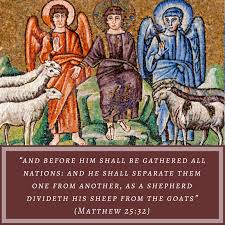
The Sheep and the Goats
When the Son of Man comes in His glory, and all the holy angels with Him, then He will sit on the throne of His glory.
“All the nations will be gathered before Him, and He will separate them one from another, as a shepherd divides his sheep from the goats. “And He will set the sheep on His right hand, but the goats on the left.
“Then the King will say to those on His right hand, ‘Come, you blessed of My Father, inherit the kingdom prepared for you from the foundation of the world: ‘for I was hungry and you gave Me food; I was thirsty and you gave Me drink; I was a stranger and you took Me in; ‘I was naked and you clothed Me; I was sick and you visited Me; I was in prison and you came to Me.’
“Then the righteous will answer Him, saying, ‘Lord, when did we see You hungry and feed You,or thirsty and give You drink? ‘When did we see You a stranger and take You in, or naked and clothe You? ‘Or when did we see You sick, or in prison, and come to You?’
“And the King will answer and say to them, ‘Assuredly, I say to you, inasmuch as you did it to one of the least of these My brethren, you did it to Me.’ “Then He will also say to those on the left hand, ‘Depart from Me, you cursed, into the everlasting fire prepared for the devil and his angels: ‘for I was hungry and you gave Me no food; I was thirsty and you gave Me no drink; ‘I was a stranger and you did not take Me in, naked and you did not clothe Me, sick and in prison and you did not visit Me.’
“Then they also will answer Him, saying, ‘Lord, when did we see You hungry or thirsty or a stranger or naked or sick or in prison, and did not minister to You?’
“Then He will answer them, saying, ‘Assuredly, I say to you, inasmuch as you did not do it to one of the least of these, you did not do it to Me.’ “And these will go away into everlasting punishment, but the righteous into eternal life.” (Matthew 25:31-46)
From Ray Stedman: "It is hard for us to remember that these words were uttered by a Man standing in the gathering dusk on the Mount of Olives, in the midst of a tiny band of forsaken men, and looking out over a city where even at that moment his enemies were completing the plans for his arrest and execution. When Jesus uttered these words, by every human appearance he was defeated. The powers of darkness were triumphant, the shadow of the cross was falling across his path way, the crowds that once had followed him had long since gone, his friends were fearful and powerless, and one of them was even then set to betray him. Yet as he surveyed the centuries he saw the light that was yet to come, and without uncertainty in his words, in that hour of triumphant evil and seeming human defeat, he declared, "When the Son of man comes in his glory...he will sit on his glorious throne. [And] before him will be gathered the nations."
The mention of nations has proved confusing to some. They have thought of this as a judging of individuals on the basis of their national affiliation; i.e., each will be held accountable for the way his government behaved as a nation. But such is not the case. Those who appear before this judgment seat do not come as Englishmen or Americans or Chinese or Afghans. The Greek word translated "nations" is literally the word "Gentiles." This is, then, the judgment of the Gentiles, the non-Jewish peoples of earth. They are persons living on earth at the time of Christ's manifestation of his presence in power and great glory.
The purpose of the judgment is obviously to determine who shall enter the kingdom of God which the Son has come to establish. Through all the great discourses of Jesus in the gospels the evident passion of his heart is to see the will of God done on earth as it is in heaven. He will manifest himself in power for the very purpose of fulfilling those ancient dreams of the prophets-an earth that will be filled with the righteousness of God as the waters cover the sea. But only the righteous will be allowed to enter.
It is important to note, too, that it is a judgment of sheep and goats, not one of sheep and wolves! Jesus is not choosing between the obviously bad and the obviously good. There is no division here between the opponents of the gospel and the believers in it. That separation is to be made in the very hour of the appearing of Jesus in power and glory. As Paul tells us in 2 Thessalonians 1:9:"When the Lord Jesus is revealed from heaven with his mighty angels in flaming fire, inflicting vengeance upon those who do not know God and upon those who do not obey the gospel of our Lord Jesus. They shall suffer the punishment of eternal destruction and exclusion from the presence of the Lord and from the glory of his might." But in the judgment of the sheep and the goats Jesus is distinguishing sharply among persons all of whom profess to be Christians and claim to belong to him as members of the family of God. It is the separation of the hypocrites from the real; of the false from the true.
Some commentators have felt there are three groups in this judgment scene: the sheep, the goats, and another group whom Jesus terms "my brethren" who are the point of testing at the judgment. These "brethren" would likely be the 144,000 Jewish believers who are closely identified with the Lord during the whole period of his presence behind the scenes. The Lord Jesus says to both the sheep and the goats, "'...as you did it [or did it not] to one of the least of these my brethren, you did it [or did it not] to me.'" It seems highly likely that there is this third group involved. Certainly, during the Tribulation each of these 144,000 will be, as Jesus himself was in the days of his flesh, "despised and rejected of men." It will be a severe test of true love to show kindness toward them for they will be an object of furious hatred by the Lawless One and the authorities of earth in that day.
On the other hand, others feel that by "my brethren" the Lord is simply indicating any individual among the sheep or goats who is in need in the last days and to whom loving help is either extended or withheld. Whichever view is held, it is evident that the principles of our Lord's judgment then are not different from the principles by which he judges men throughout the centuries. God acts, "as it was in the beginning, is now, and ever shall be, world without end, Amen." He will distinguish the hypocrites from among us today exactly on the same basis as he distinguished them then.
Let us now return to the scene our Lord describes, when he will do what no other figure in human history is capable of: dissolve all national distinctions, unite all the nations as one, and sit as the unchallenged Judge over all men:
"Then the King will say to those at his right hand, 'Come, O blessed of my Father, inherit the kingdom prepared for you from the foundation of the world; for I was hungry and you gave me food, I was thirsty and you gave me drink, I was a stranger and you welcomed me, I was naked and you clothed me, I was sick and you visited me, I was in prison and you came to me.'"
The arresting thing about this is that Jesus is clearly saying that the ultimate mark of an authentic Christian is not his creed, or his faith, or his Bible knowledge, but the concern which he shows to those who are in need. The practical demonstration of love is the final proof. And note also that Jesus does not ask anyone to present his case or argue his cause. He asks no questions nor requests any evidence. He simply extends to this one group the invitation, "Come, O blessed of my Father, inherit the kingdom." Then he explains the basis of his choice. He has simply noted that when they had opportunity to help someone in need, they did it. Nothing more is required. It is sobering to realize that Jesus identifies himself with those in need. If you help them, he says, you are really helping me; and if you ignore them you are ignoring me. He flings the cloak of relationship around them and calls them "my brethren."
The sheep who inherit the kingdom are those who have responded to these needs in love, concern, and ministry. They have probably done so at considerable cost or risk to themselves. But no matter, they did what they could. With the goats it is the opposite story:
Then he will say to those at this left hand, Depart from me, you cursed, into the eternal fire prepared for the devil and his angels; for I was hungry and you gave me no food, I was thirsty and you gave me no drink, I was a stranger you did not welcome me, naked and you did not clothe me, sick and in prison and you did not visit me.
The seriousness of this matter of helping the needy is seen in the severity of the Lord's words here. "Depart from me you cursed, into the eternal fire prepared for the devil and his angels." And let us remember that these are people who honestly think they are sheep! They can point with pride to a moment when they made a profession of belief, they are, perhaps, dogmatic about a creed and are church members in good standing, but by their lack of response to the pleas for help that come to them from every side they stand revealed as goats-false sheep-who never were sheep at all.
The reaction of both the sheep and the goats to the Lord's words is one of stunned surprise. They are completely taken aback by what he says. It is clearly evident that both groups expected a different basis of judgment. As they were being divided into one group or another they doubtless felt they knew the reason for the choice. Surely the sheep would feel that the basis was that of faith. There would be ringing in their ears all the great and marvelous words of Scripture declaring that justification before God is by faith alone. Can't you see them waiting to come before the King, each one nervously reviewing his testimony, trying to recall the exact wording of the great promises on which he would rest all his hopes for this moment?
But the strange thing is, not one is ever given the chance to say a word. The issue is already settled. Each person is simply told to which group he belongs.
"Then the righteous will answer him, 'Lord, when did we see you hungry and feed you, or thirsty and give you drink? And when did we see you a stranger and welcome you, or naked and clothe you? And when did we see you sick or in prison and visit you?'"
But of course the issue really is one of faith. The sheep are asked to take their place on the right hand of the throne because all through their lives their genuine faith has been producing its inevitable fruit of good works. Unthinkingly, unconsciously, born of love for Jesus Christ, they have been responding to the pleas and the needs of those about them. They kept no records, they expected no praise. For them it has been a glad privilege. They were unaware they were doing anything unusual, but found a real delight in meeting the needs of others. There was no hardship involved. They felt it was a continuing joy to be permitted to minister in Christ's name. But not one deed performed in that way has ever escaped the eye of their watching Lord. There is no need for him to examine them. They had laid up abundant treasure in heaven.
But the goats are equally surprised. They, too, are caught off guard by this basis of judgment:
"Then they also will answer, 'Lord, when did we see you hungry or thirsty or a stranger or naked or sick or in prison, and did not minister to you?"
Yet they may have guessed even more closely than the sheep the true basis for judgment. Very likely they are sure that it is good works. They know that God is interested in the poor, the down-trodden, the oppressed, and they are all ready for him. Already they have been making long mental lists of the many times they have ministered to those in need about them. They can recall detailed descriptions of what they did. They can total up large sums of money given, complete with income tax receipts. No doubt the amount of money so expended is terribly impressive, for as someone has remarked, it takes a great deal of philanthropy to deodorize a fortune! They have even put in long hours working for charity, fighting for racial equality, or protesting sub-standard housing. To these self-justifying persons the King replies: "Truly, I say to you, as you did it not to one of the least of these, you did it not to me."
Good Works That Aren't Good
They are even more surprised than the sheep at the Lord's words. It was good deeds of the very type he describes that they were depending upon for acceptance in this hour. They are at a total loss to understand his rejection. But they have forgotten what Jesus says in the Sermon on the Mount. There he is careful to tell us that deeds done "to be seen by men" already have their reward. Even if the deeds are not publicly known, if they are done for private satisfaction they are in the same category. "Let not your left hand know what your right hand does," he says. That is, do not even take note of what you do yourself; do not even privately pat yourself on the back.
It is the times which they have forgotten that he uses for judgment, and not the times they remember. It is the times they looked the other way when some begging hand reached out. The times they were busy with other demands when word came of the sick and the dying. The times when they refused, through shame or pride, to visit some poor wretch in prison lest they be associated with him. Their eyes were averted as they walked around the stricken man lying by the wayside. They turned deaf ears to pleas when they could have helped. But these incidents have long been forgotten. They are quite honest when they say in astonishment, "Lord, when?"
But this is false Christianity, no matter how much it may be dressed in evangelical clothes. Perhaps nothing can describe it better than this prayer, written by Richard Woike. He calls it "A Prayer to Avoid" but we might well term it, "The Prayer of a Goat."
"O thou pleasant, comfortable, kindly, good-natured God: How glad I am that I can look forward, with a reasonable degree of certainty, to another ordinary day. Keep me today from anything that taxes my faith from discomfort, from unnecessary strain, from unusual problems, especially those involving sickness or death, or the necessity of extending financial aid to relatives and friends.
Dear Lord, grant that nothing may occur which will disturb my satisfaction with the way I am, and the things I say, and the thoughts I think, the acts I do, or the many deeds I leave undone. Give me this day, in addition to my daily bread, the butter, meats, and sweetmeats that are my necessary diet, and let me not be troubled by qualms of conscience concerning the amount of time and money I spend on food and clothing, pastimes, good and bad, and those pursuits which, while not of spiritual value, are the accepted hall-mark of the normal citizen of this enlightened community in this enlightened age.
About the future and the darkening trend of things, keep me from thoughtfulness. Events rush on, the world travails. Can screaming headlines prove thy hand's at work this very moment, bringing near that fateful cry, 'Behold! He comes!'? O, Lord, such disconcerting thoughts! Keep me from worrying about such things, and guide me safely to and from my office, and my home. Amen."
Nothing reveals more sharply the radical difference between God's judging and man's than this story of the sheep and the goats. Even our treasured "good deeds" are shown up for what they are in the searching light from this throne of glory. Good deeds that are not the unconscious, automatic response of a heart indwelt by Jesus Christ are not truly "good" deeds. They are planned deeds, contrived, carefully performed for the public eye, or if in private, done in the hope that they will purchase some merit or favor before God.
But God's judgments take note only of the unconscious moments of our lives, the times when we are off guard, when we are unaware. It is then that we truly reveal ourselves. The test comes, not in our remembered actions, but in our unconscious reactions, our instinctive, unplanned responses.
This was borne sharply to my mind some time ago when, in the company of a number of friends, I attended a public concert in a large city. The officials of both the city and state were in attendance and a great crowd of people had jammed into a small open air square. The officials were seated in front row chairs on a small platform. Among the various performers that night was a young starlet from Hollywood. She was dressed in a strapless evening gown and in this revealing attire came to the microphone to sing. She did several swinging numbers, swaying with her hips and snapping her fingers. As she sang I happened to turn to note the reaction of the mayor of the city, seated on the front row.
Evidently he had lost himself in the performance, for his guard was down. His eyes were agleam with lechery, his mouth had dropped partly open, and he was fairly drooling. I saw also the governor of the state, seated a few chairs away, who was eying the mayor with a stern look of disapproval. While I watched, the governor caught the mayor's eye. Immediately he reddened, shifted uneasily in his chair, closed his mouth, sat straight up and looked out over the audience. The governor's glance had said to him, in the most eloquent silence I have ever heard, "Shape up, man, you're in public!" Though the mayor was the soul of propriety the rest of the evening, in one unconscious moment reality had shown through.
If we are not going to be tested by the times when we are alert and on guard, but God is "unfair" enough to catch us when we are simply responding to what we are, then what we are must be what he demands. There is only one life that is sufficient for that kind of demand. Only one life is capable of responding instantaneously with unselfish love to the needs of others. That is the life of Jesus Christ. If we have not received him into our hearts we do not have that life. If we have received him, we need to make ourselves available to him. We should be willing, moment by moment, to reach out to others in the strength and love which he will impart to us, as soon as we begin to obey. This alone is the life that can meet the test.
Now the discourse is ended. We have heard the greatest prophet who ever lived outline for us the history of the future. It has been a fascinating experience, containing many surprising and unexpected revelations. If we had never read this discourse before we could not possibly have guessed what the outcome of history will be. But now that we know, what shall we do about it?
There can be only one answer to that. We must do what our Lord says. We must obey the command he repeats again and again. Watch! Keep alert! Watch! We have learned now what that means. It means three specific and definite things: It means we are to help one another feed upon the living Lord Jesus, as revealed in the written Word of God. We must study the Book. It means we must walk in the Spirit, depending not upon our human resources and weapons, but upon the power of an indwelling Spirit who is God himself, at work in us. It means we must live dangerously, venturing ourselves for Christ's sake. We must keep thrusting out in his name, buying up every opportunity to meet those around us at the point of their need.
This, and this alone, is watching. Nothing can take its place. Therefore,
Watch at all times, praying that you may have strength to escape all these things that will take place, and to stand before the Son of Man (Luke 21:36).

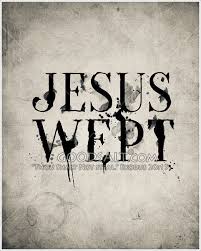 Jesus Wept
Jesus Wept
Now as He drew near, He saw the city and wept over it, saying, “If you had known, even you, especially in this your day, the things that make for your peace! But now they are hidden from your eyes. “For days will come upon you when your enemies will build an embankment around you, surround you and close you in on every side, “and level you, and your children within you, to the ground; and they will not leave in you one stone upon another, because you did not know the time of your visitation.” (Luke 19:41-44)
Three times Jesus lamented for Jerusalem, the third time while carrying His own cross which was the efficient cause of the destruction of the nation, dismantling of the Temple, and the worldwide dispersion of the people. “In all our affliction, He Himself was afflicted”. It was precisely *because* the Good Shepherd was smitten that the Flock of God was scattered. They are His, and “in Him”, so are required in their measure to also bear sufferings as He did (though theirs of course are not propitiatory).
Matthew’s prophetic quotation of “Out of Egypt I have called My Son” has yet to be entirely fulfilled for either Israel or for us in the Church. (Bryce Self)
The Two Cleansings of the Temple by Jesus

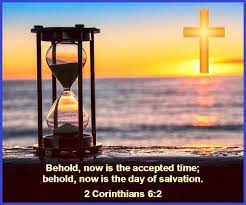
Be Encouraged!
(If you know Jesus, that is)
And I, brethren, could not speak to you as to spiritual people but as to carnal, as to babes in Christ.
I fed you with milk and not with solid food; for until now you were not able to receive it,
and even now you are still not able; for you are still carnal.
For where there are envy, strife, and divisions among you, are you not carnal and behaving like mere men?
For when one says, “I am of Paul,” and another, “I am of Apollos,” are you not carnal?
Who then is Paul, and who is Apollos, but ministers through whom you believed, as the Lord gave to each one?
I planted, Apollos watered, but God gave the increase.
So then neither he who plants is anything, nor he who waters, but God who gives the increase.
Now he who plants and he who waters are one,
and each one will receive his own reward according to his own labor.
For we are God’s fellow workers; you are God’s field, you are God’s building.
According to the grace of God which was given to me,
as a wise master builder I have laid the foundation, and another builds on it.
But let each one take heed how he builds on it.
For no other foundation can anyone lay than that which is laid, which is Jesus Christ.
Now if anyone builds on this foundation with gold, silver, precious stones, wood,
hay, straw, each one’s work will become clear;
for the Day will declare it, because it will be revealed by fire;
and the fire will test each one’s work, of what sort it is.
If anyone’s work which he has built on it endures, he will receive a reward.
If anyone’s work is burned, he will suffer loss; but he himself will be saved, yet so as through fire.
Do you not know that you are the temple of God and that the Spirit of God dwells in you?
If anyone defiles the temple of God, God will destroy him.
For the temple of God is holy, which temple you are.
Let no one deceive himself.
If anyone among you seems to be wise in this age,
let him become a fool that he may become wise.
For the wisdom of this world is foolishness with God.
For it is written, “He catches the wise in their own craftiness”
and again, “The LORD knows the thoughts of the wise, that they are futile.”
Therefore let no one boast in men.
For all things are yours: whether Paul or Apollos or Cephas, or the world or life or death, or things present or things to come--all are yours.
And you are Christ’s, and Christ is God's. (1 Corinthians 3)
Now may the God of peace who brought up our Lord Jesus from the dead, that great Shepherd of the sheep, through the blood of the everlasting covenant, make you complete in every good work to do His will, working in you what is well pleasing in His sight, through Jesus Christ, to whom be glory forever and ever. Amen.
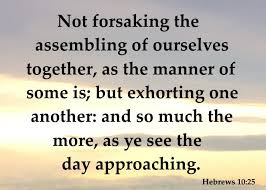

Reading Room, Homework, Music
God and the Lockdown | The Body of Christ in Perilous Times | The Crucifixion of Jesus | Catharsis!
Management of the Universe | The Left Hand of God | The Approaching Time of the End | The Return of the Landlord
The Dark Side | The Last Judgment | The Plight of the Homeless -- The Plight of the Rich | What is Money For Anyway?
Rapture Shock | The Near Future of Planet Earth | The Judgment Seat of Christ III
Citizens of New Jerusalem| The Wasted Years | How Saved are You?

Music
There is a Fountain 1 | There is a Fountain 2 | I Will Sing of My Redeemer
Bid You Good Night | I Saw the Light | Five Jewish Worship Songs
The Carter Family: You've Been a Friend to Me
Bob Dylan: The Times They Are A-Changin' (Audio) 1964
Stanley Brothers: Long Journey Home
Caleb Klauder & Reeb Willms - Gloryland
Norman Blake and Nancy Blake - All the Good Times are Over

Notes by Lambert Dolphin
Lambert's Main Library
Email Lambert Dolphin
Archive for Newsletters
Library Annex (500+ new articles since 2018)
Help Thyself. No Charge



May 30, 2020. August 20, 2020. March 15, 2022. July 27, 2022.
January 26, 2023.




 He was quoting the prophet Zechariah whose original statement was even more incongruous and strange:
He was quoting the prophet Zechariah whose original statement was even more incongruous and strange:  Yahweh calls the shepherd "My Shepherd," indicating that this Shepherd is no ordinary leader. Indeed, Yahweh also calls him "the Man who is My Companion." Surely that is more than high praise. This Shepherd is One who is side by side with, or the equal of, the Lord! The term "associate" (or "Companion," v. 7) is used to refer to those who are close neighbors or close companions (Leviticus 6:2; 18:20; 19:15). The equality that such a relationship brings to mind is the equality with God claimed by Jesus in John 10:30 and 14:9. The Shepherd's close association with the Lord strengthens the case for identifying him as the Shepherd of 11:4-14 and the One who was pierced in 12:10.
Yahweh calls the shepherd "My Shepherd," indicating that this Shepherd is no ordinary leader. Indeed, Yahweh also calls him "the Man who is My Companion." Surely that is more than high praise. This Shepherd is One who is side by side with, or the equal of, the Lord! The term "associate" (or "Companion," v. 7) is used to refer to those who are close neighbors or close companions (Leviticus 6:2; 18:20; 19:15). The equality that such a relationship brings to mind is the equality with God claimed by Jesus in John 10:30 and 14:9. The Shepherd's close association with the Lord strengthens the case for identifying him as the Shepherd of 11:4-14 and the One who was pierced in 12:10.
 Then the LORD God said, “Behold, the man has become like one of Us, to know good and evil. And now, lest he put out his hand and take also of the tree of life, and eat, and live forever”--therefore the LORD God sent him out of the garden of Eden to till the ground from which he was taken. So He drove out the man; and He placed cherubim at the east of the garden of Eden, and a flaming sword which turned every way, to guard the way to the tree of life.“ (Genesis 3:22-24)
Then the LORD God said, “Behold, the man has become like one of Us, to know good and evil. And now, lest he put out his hand and take also of the tree of life, and eat, and live forever”--therefore the LORD God sent him out of the garden of Eden to till the ground from which he was taken. So He drove out the man; and He placed cherubim at the east of the garden of Eden, and a flaming sword which turned every way, to guard the way to the tree of life.“ (Genesis 3:22-24)
 Then the LORD saw that the wickedness of man was great in the earth, and that every intent of the thoughts of his heart was only evil continually. And the LORD was sorry that He had made man on the earth, and He was grieved in His heart. So the LORD said, “I will destroy man whom I have created from the face of the earth, both man and beast, creeping thing and birds of the air, for I am sorry that I have made them.”
Then the LORD saw that the wickedness of man was great in the earth, and that every intent of the thoughts of his heart was only evil continually. And the LORD was sorry that He had made man on the earth, and He was grieved in His heart. So the LORD said, “I will destroy man whom I have created from the face of the earth, both man and beast, creeping thing and birds of the air, for I am sorry that I have made them.”

 Now the whole earth had one language and one speech. And it came to pass, as they journeyed from the east, that they found a plain in the land of Shinar, and they dwelt there. Then they said to one another, “Come, let us make bricks and bake them thoroughly.” They had brick for stone, and they had asphalt for mortar. And they said, “Come, let us build ourselves a city, and a tower whose top is in the heavens; let us make a name for ourselves, lest we be scattered abroad over the face of the whole earth.”
Now the whole earth had one language and one speech. And it came to pass, as they journeyed from the east, that they found a plain in the land of Shinar, and they dwelt there. Then they said to one another, “Come, let us make bricks and bake them thoroughly.” They had brick for stone, and they had asphalt for mortar. And they said, “Come, let us build ourselves a city, and a tower whose top is in the heavens; let us make a name for ourselves, lest we be scattered abroad over the face of the whole earth.”  The Bible plays upon the name for Babel, and links it with the Hebrew word for confusion, balal. It says this was a veritable Babel of confusion. It is interesting that the name Babel means "the gate of God." That is what man named the tower. But in the ultimate outcome, Babel became the place of confusion. "The gate of God," in man's eyes, becomes confusion (balal) in the eyes of God. Since that day men have been divided by this confusion of tongues.
The Bible plays upon the name for Babel, and links it with the Hebrew word for confusion, balal. It says this was a veritable Babel of confusion. It is interesting that the name Babel means "the gate of God." That is what man named the tower. But in the ultimate outcome, Babel became the place of confusion. "The gate of God," in man's eyes, becomes confusion (balal) in the eyes of God. Since that day men have been divided by this confusion of tongues.


 Dispersal Example 5: The Babylonian Captivity of Israel
Dispersal Example 5: The Babylonian Captivity of Israel

 Excerpt from The Martyrdom of Polycarp
Excerpt from The Martyrdom of Polycarp







 Jesus Wept
Jesus Wept 



